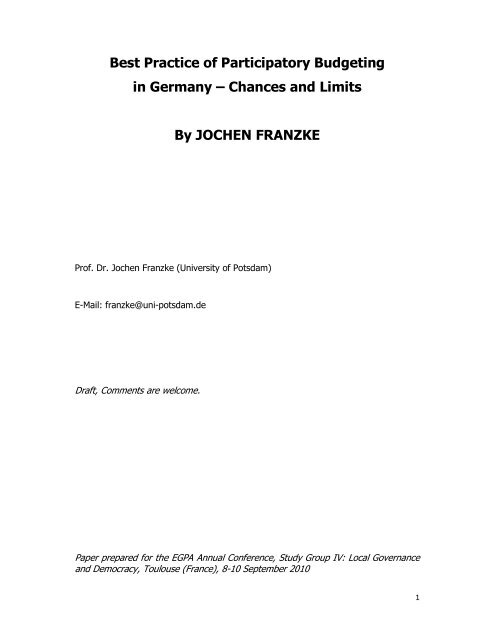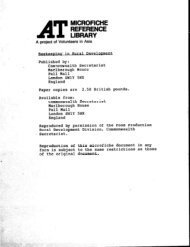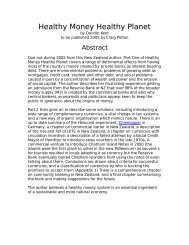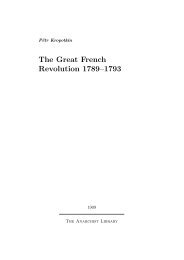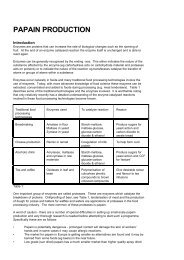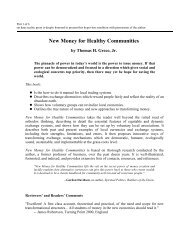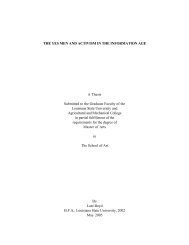Best Practice of Participatory Budgeting in Germany – Chances and ...
Best Practice of Participatory Budgeting in Germany – Chances and ...
Best Practice of Participatory Budgeting in Germany – Chances and ...
Create successful ePaper yourself
Turn your PDF publications into a flip-book with our unique Google optimized e-Paper software.
<strong>Best</strong> <strong>Practice</strong> <strong>of</strong> <strong>Participatory</strong> <strong>Budget<strong>in</strong>g</strong><br />
<strong>in</strong> <strong>Germany</strong> <strong>–</strong> <strong>Chances</strong> <strong>and</strong> Limits<br />
By JOCHEN FRANZKE<br />
Pr<strong>of</strong>. Dr. Jochen Franzke (University <strong>of</strong> Potsdam)<br />
E-Mail: franzke@uni-potsdam.de<br />
Draft, Comments are welcome.<br />
Paper prepared for the EGPA Annual Conference, Study Group IV: Local Governance<br />
<strong>and</strong> Democracy, Toulouse (France), 8-10 September 2010<br />
1
1 INTRODUCTION<br />
<strong>Participatory</strong> budgets (or citizen’s budgets) are a modern form <strong>of</strong> the <strong>in</strong>volvement <strong>of</strong><br />
<strong>in</strong>habitants <strong>in</strong> the discussion <strong>of</strong> the municipal budget <strong>and</strong>/or allocation <strong>of</strong> municipal<br />
public f<strong>in</strong>ances <strong>in</strong> a direct, permanent <strong>and</strong> <strong>in</strong>dependent way. 1<br />
<strong>Participatory</strong> budgets are formal procedures for any city all over the world, <strong>in</strong>dependent<br />
from their size <strong>and</strong> number <strong>of</strong> population. The <strong>in</strong>strument is very flexible<br />
<strong>and</strong> adaptable to different politico-adm<strong>in</strong>istrative systems <strong>and</strong> variable political orientations.<br />
It’s suitable to the current governance trend <strong>of</strong> local reforms <strong>and</strong> can be<br />
comb<strong>in</strong>ed with other <strong>in</strong>struments <strong>of</strong> local democracy. (See Franzke 2007)<br />
The idea <strong>of</strong> <strong>in</strong>clud<strong>in</strong>g citizens <strong>in</strong> the local budgetary decision process was <strong>in</strong>vented<br />
first <strong>in</strong> Brazil <strong>in</strong> the city <strong>of</strong> Porto Alegre <strong>in</strong> 1989 under the name Orçamento Participativo<br />
(See Herzberg 2001; Baiocchi 2005). S<strong>in</strong>ce then the idea spread over Brazil,<br />
other countries <strong>of</strong> Lat<strong>in</strong> <strong>and</strong> North America, Asia, Africa <strong>and</strong> f<strong>in</strong>ally Europe (See<br />
World Bank 2007, Wampler 2000). But accord<strong>in</strong>g to different legal frameworks, varied<br />
socio-economical conditions <strong>and</strong> diverse political <strong>in</strong>tentions <strong>of</strong> the supporters <strong>of</strong><br />
participatory budgets the procedure <strong>in</strong> different countries is highly specific. Therefore,<br />
the ma<strong>in</strong> research question <strong>of</strong> this contribution is to f<strong>in</strong>d out, how participatory<br />
budgets can be adapted to the legal, political <strong>and</strong> adm<strong>in</strong>istrative framework condition<br />
at local level <strong>in</strong> <strong>Germany</strong>. This <strong>in</strong>cludes the question <strong>of</strong> the possible additional benefit<br />
<strong>of</strong> the procedure for local democracy.<br />
However, it has been taken <strong>in</strong>to account, that the data about the conditions <strong>and</strong> results<br />
<strong>of</strong> participatory budgets <strong>in</strong> <strong>Germany</strong> are frequently based only on <strong>in</strong>formation <strong>of</strong><br />
the projects organizers. 2 Scientific evaluations <strong>of</strong> <strong>in</strong>dividual projects are still rather<br />
rare (with the exception <strong>of</strong> Berl<strong>in</strong>-Lichtenberg <strong>and</strong> Cologne). At this stage <strong>of</strong> developments<br />
<strong>of</strong> participatory budget<strong>in</strong>g <strong>in</strong> <strong>Germany</strong> it may be useful, to map the state <strong>of</strong><br />
the art, to describe the st<strong>and</strong>ards <strong>of</strong> the procedure <strong>in</strong> <strong>Germany</strong> <strong>and</strong> to affiliate some<br />
further research questions.<br />
2 THEORETICAL CONSIDERATIONS<br />
<strong>Participatory</strong> budgets <strong>in</strong> German municipalities are a new procedure <strong>of</strong> local governance<br />
s<strong>in</strong>ce app. ten years. Meanwhile <strong>in</strong> <strong>Germany</strong> citizen participation takes place on<br />
all possible levels <strong>and</strong> to nearly all topics. Only the crucial budget plan, which fix the<br />
local f<strong>in</strong>ancial <strong>and</strong> political priorities for the next year, rema<strong>in</strong> for long time a taboo<br />
for real citizen’s participation. But it exposed to be the largest participation gap.<br />
1 This paper is based on the f<strong>in</strong>d<strong>in</strong>gs <strong>of</strong> a research project on participatory budget<strong>in</strong>g <strong>in</strong> <strong>Germany</strong>,<br />
which the paper giver together with Pr<strong>of</strong>. He<strong>in</strong>z Kleger carried through between 2005 <strong>and</strong> 2009. Its<br />
prelim<strong>in</strong>ary results were published <strong>in</strong> two anthologies (Kleger/Franzke 2006; Kleger/Franzke 2008)<br />
<strong>and</strong> some thesis’s, supervised by He<strong>in</strong>z Kleger or me (Herzberg 2001 und 2009, Weise 2006, Buß<br />
2008, Roeder 2010). The f<strong>in</strong>al publication <strong>of</strong> the research results is actually <strong>in</strong> pr<strong>in</strong>t: Franzke,<br />
Jochen/Kleger, He<strong>in</strong>z (2010): Kommunale Bürgerhaushalte. Potentiale, Chancen und Grenzen, Berl<strong>in</strong>:<br />
Edition Sigma. With this paper a short version <strong>of</strong> them is presented.<br />
2 The <strong>in</strong>ternet-homepage <strong>of</strong> “www.buergerhaushalt.org” is helpful to w<strong>in</strong> additional <strong>in</strong>formation.<br />
2
Their <strong>in</strong>novative character <strong>of</strong> citizen’s budgets is especially based on a unique comb<strong>in</strong>ation<br />
<strong>of</strong> two different trajectories <strong>of</strong> local reforms: on the one h<strong>and</strong> they are part <strong>of</strong><br />
public management reforms, aim<strong>in</strong>g to improve the quality <strong>of</strong> public budgets as the<br />
ma<strong>in</strong> steer<strong>in</strong>g <strong>in</strong>strument <strong>of</strong> local politics (See Bovaird/Löffler 2002). On the other<br />
h<strong>and</strong> they belong to the participatory reforms, aim<strong>in</strong>g to <strong>in</strong>crease citizen’s attendance<br />
<strong>in</strong> the local decision mak<strong>in</strong>g process. So citizen’s budgets both as subject <strong>of</strong> public<br />
management <strong>and</strong> local democracy comprise issues <strong>of</strong> efficiency, effectiveness, <strong>and</strong><br />
legitimacy as well as legality <strong>of</strong> local policy.<br />
Both trajectories <strong>of</strong> local adm<strong>in</strong>istrative reforms are based upon an <strong>in</strong>tensive theoretical<br />
discussion with<strong>in</strong> political <strong>and</strong> adm<strong>in</strong>istrative sciences. The first one is the local<br />
governance debate, analyz<strong>in</strong>g possible new steer<strong>in</strong>g methods for solv<strong>in</strong>g local problems.<br />
(See Elster 1998, Bogason 2001; Denters 2005; Bovaird 2007; Kooiman 2007;<br />
Franzke et al. 2007, OECD 2009) The second one is deal<strong>in</strong>g with the “delegative democracy”<br />
as a new subtype <strong>of</strong> local democracy, comb<strong>in</strong><strong>in</strong>g elements <strong>of</strong> representative<br />
<strong>and</strong> direct democracy. (See Habermas 1992, O’Donnell 1994, Sousa 1998, Abers<br />
2000)<br />
S<strong>in</strong>tomer, Herzberg <strong>and</strong> Roecke developed a general def<strong>in</strong>ition <strong>of</strong> participatory budgets.<br />
They try to def<strong>in</strong>e there “m<strong>in</strong>imal requisites <strong>in</strong> order to clearly differentiate this<br />
participatory procedure from others (such as neighbourhood funds or community<br />
development) <strong>and</strong> which, at the same time, is comprehensive enough <strong>in</strong> order to<br />
give sufficient leeway to procedures with different specificities”. (S<strong>in</strong>tomer et al.<br />
2007, 118, See also S<strong>in</strong>tomer et al. 2010, Heimans 2002) Accord<strong>in</strong>g to them, participatory<br />
budget<strong>in</strong>g allows the participation <strong>of</strong> nonelected citizens <strong>in</strong> the conception<br />
<strong>and</strong>/or allocation <strong>of</strong> public f<strong>in</strong>ances under the follow<strong>in</strong>g circumstances: (See S<strong>in</strong>tomer<br />
at al. 2010: 39ff.)<br />
• The f<strong>in</strong>ancial <strong>and</strong>/or budgetary dimension must be discussed; participatory<br />
budget<strong>in</strong>g is deal<strong>in</strong>g with the problem <strong>of</strong> limited resources.<br />
• The city level or a (decentralized) district with an elected body <strong>and</strong> some<br />
power over adm<strong>in</strong>istration has to be <strong>in</strong>volved. The neighbourhood level is not<br />
enough.<br />
• It has to be a repeated process. One meet<strong>in</strong>g or referendum on f<strong>in</strong>ancial issues<br />
can’t be called participatory budget.<br />
• The process must <strong>in</strong>clude some form <strong>of</strong> public deliberation with<strong>in</strong> the framework<br />
<strong>of</strong> specific meet<strong>in</strong>gs or forums. The open<strong>in</strong>g <strong>of</strong> adm<strong>in</strong>istrative meet<strong>in</strong>gs<br />
or representative <strong>in</strong>stances to “normal” citizens is no participatory budget<strong>in</strong>g.<br />
• Some accountability on the output is required.<br />
On the basis <strong>of</strong> this def<strong>in</strong>ition S<strong>in</strong>tomer, Herzberg <strong>and</strong> Röcke developed six models <strong>of</strong><br />
participatory budget<strong>in</strong>g <strong>in</strong> Europa: Porto Alegre adapted for Europe; Participation <strong>of</strong><br />
organized <strong>in</strong>terests; Community funds on local <strong>and</strong> city level; the public/private negotiation<br />
table; Proximity participation <strong>and</strong> consultation on public f<strong>in</strong>ances. (See S<strong>in</strong>tomer<br />
et al. 2007: 119ff.)<br />
3
For <strong>Germany</strong> this set <strong>of</strong> models is possibly too broad. Therefore it may be useful to<br />
describe different levels <strong>of</strong> participatory budget<strong>in</strong>g accord<strong>in</strong>g to the limits, set by<br />
German law for citizens <strong>in</strong>clusion <strong>in</strong> the decision on local budgets (as the exclusive<br />
right <strong>of</strong> the local councillors). So at the moment only two <strong>of</strong> the above mentioned<br />
models are relevant for <strong>Germany</strong>:<br />
- “Consultation on public f<strong>in</strong>ances”: The procedure <strong>of</strong> this model is st<strong>and</strong>ardised:<br />
<strong>in</strong>formation, consultation <strong>and</strong> accountability. It’s usually open to all citizens<br />
<strong>and</strong> <strong>in</strong>habitants. It can aim either to evaluate public services <strong>and</strong> <strong>in</strong>stitutions<br />
or to budget balanc<strong>in</strong>g. The municipal adm<strong>in</strong>istration sets the agenda<br />
<strong>and</strong> elaborates the methodology. The procedural autonomy <strong>of</strong> the civil society<br />
with<strong>in</strong> this procedure is relatively weak. This model is far common <strong>in</strong> <strong>Germany</strong><br />
(e. g. Hilden, Rhe<strong>in</strong>stetten, Emsdetten).<br />
- „Proximity“ participation: This model partially accedes over the pure consultations<br />
on public f<strong>in</strong>ances. It <strong>in</strong>cludes more parts <strong>of</strong> the local budget as <strong>in</strong>vestments<br />
on neighbourhood-level <strong>and</strong> strategic plann<strong>in</strong>g on city level. The<br />
neighbourhoods are <strong>in</strong>tegrated <strong>in</strong> the discussion process. All <strong>in</strong> all the level <strong>of</strong><br />
formal <strong>in</strong>tegration <strong>of</strong> civil society <strong>and</strong> the deliberative quality <strong>in</strong> this model is<br />
higher than <strong>in</strong> the consultation model. This model is typical for e. g. Berl<strong>in</strong>-<br />
Lichtenberg, Berl<strong>in</strong>-Marzahn-Hellersdorf.<br />
Accord<strong>in</strong>g to this legal restrictions <strong>in</strong> <strong>Germany</strong> a four levels participatory budget<strong>in</strong>g<br />
are permitted: Better Information on the budget, more transparency <strong>of</strong> the budget,<br />
more accountability <strong>of</strong> councillors <strong>in</strong> budgetary affairs <strong>and</strong> f<strong>in</strong>ally changes <strong>in</strong> the local<br />
budgetary decision procedures. (See Eb<strong>and</strong>on/Frankl<strong>in</strong> 2004, 2006)<br />
Level I: Better Information on the Budget<br />
Better, more cont<strong>in</strong>uous <strong>and</strong> real <strong>in</strong>formation <strong>of</strong> the citizens about the f<strong>in</strong>ancial situation<br />
<strong>of</strong> the municipality is def<strong>in</strong>itely one prerequisite for a citizen’s budget. This process<br />
may strengthen the citizen’s underst<strong>and</strong><strong>in</strong>g for the needs with<strong>in</strong> municipal budgetary<br />
policy, <strong>in</strong> f<strong>in</strong>ancially difficult times even for possible cuts <strong>in</strong> the budget. The<br />
way <strong>of</strong> manag<strong>in</strong>g better <strong>in</strong>formation on the budget <strong>in</strong>cludes two different tasks: Primarily,<br />
the local adm<strong>in</strong>istration <strong>and</strong> especially the councillors are responsible for <strong>in</strong>creas<strong>in</strong>g<br />
the quality <strong>of</strong> their <strong>in</strong>formation policy, particularly by us<strong>in</strong>g modern IT.<br />
Naturally the local media play also an important role. On the other h<strong>and</strong>, the citizens<br />
<strong>and</strong> their organizations are called upon to permanently claim more <strong>in</strong>formation about<br />
the budget. By better <strong>in</strong>formation a local budget does not become, however, yet the<br />
citizen’s budget. But it is a high symbolic step <strong>in</strong>to this direction.<br />
Level II: More Transparency <strong>of</strong> the Budget<br />
The “traditional” local budget is a bulky good <strong>of</strong> <strong>in</strong>formation. So far it is readably only<br />
for some <strong>of</strong> the local councillors, for most <strong>of</strong> the citizens, however, it rema<strong>in</strong>s "a<br />
book with seven seals". Better <strong>in</strong>formation is not enough to change this situation;<br />
additionally more transparency <strong>of</strong> the local budgets is needed. It has to be made<br />
4
"readable", easily underst<strong>and</strong>able to the citizens for better assess<strong>in</strong>g the performance<br />
<strong>of</strong> local f<strong>in</strong>ances. Than the true local f<strong>in</strong>ancial situation become more visible to<br />
them. More transparency <strong>of</strong> the budget may also change the behaviour <strong>of</strong> the councillors.<br />
Budgetary affairs will be than more public than before; by citizen’s budgets<br />
they can also faster response to people’s dem<strong>and</strong>s. But establish<strong>in</strong>g more transparency<br />
<strong>of</strong> the budget is first <strong>of</strong> all a task for local adm<strong>in</strong>istration. It has to adopt resources<br />
for his new task <strong>and</strong> develop methods for mak<strong>in</strong>g the budget transparent.<br />
Level III: More Accountability <strong>of</strong> Councillors <strong>in</strong> Budgetary Affairs<br />
At this level the councillors recogniz<strong>in</strong>g the citizens as consultants <strong>in</strong> the budgetary<br />
procedure, possibly with own <strong>in</strong>dependent committees. This <strong>in</strong>cludes on the other<br />
h<strong>and</strong> the acceptance <strong>of</strong> councillors’ right for f<strong>in</strong>al decid<strong>in</strong>g budgetary affairs by the<br />
citizens. But the councillors affirm to expla<strong>in</strong> their decisions on citizen’s suggestions<br />
for br<strong>in</strong>g<strong>in</strong>g more accountability <strong>in</strong> the budgetary process. At this level the citizen’s<br />
budget process forms an element <strong>of</strong> cooperative local democracy.<br />
Level IV: Changes <strong>in</strong> Local Budgetary Decision Procedures<br />
The highest level <strong>of</strong> citizen’s budget<strong>in</strong>g will be reached, when the citizens can decide<br />
directly on the municipal budget or parts <strong>of</strong> it. The legal preconditions for this radical<br />
change <strong>in</strong> the local budgetary decision procedures <strong>in</strong> <strong>Germany</strong> do still not exist. Possibly<br />
this problem could be solve, when the proposals <strong>of</strong> the annual citizen’s budget<br />
procedure will be get by decision <strong>of</strong> the local council topic <strong>of</strong> a citizen’s decision (referenda).<br />
By this way citizen’s budgets could be an element <strong>of</strong> direct local democracy.<br />
Citizen’s budgets can be <strong>in</strong>cluded <strong>in</strong> the current reform concept <strong>of</strong> establish “Citizen’s<br />
Municipalities” (“Bürgerkommunen”), a concept actually very popular <strong>in</strong> <strong>Germany</strong><br />
(See Bogumil et al. 2003). To overcome the crisis <strong>of</strong> local autonomy (e. g. f<strong>in</strong>ancial<br />
crisis <strong>and</strong> decisional leeway) municipalities shall be revitalized. In this process the<br />
classical “power triangle” between citizens (<strong>and</strong> its organizations), local politicians<br />
(councillors) <strong>and</strong> local adm<strong>in</strong>istration shall be newly arranged. Citizens shall be <strong>in</strong>cluded<br />
more directly <strong>in</strong> the solution <strong>of</strong> local public problems to reach the follow<strong>in</strong>g<br />
aims (See Bogumil et al. 2003):<br />
- Higher acceptance (citizen’s satisfaction with local services <strong>and</strong> plann<strong>in</strong>g);<br />
- More democracy (stronger citizen’s participation <strong>in</strong> the local decision process);<br />
- Stronger solidarity <strong>and</strong> identity (helpfulness <strong>of</strong> citizens among themselves <strong>and</strong><br />
their identification with the city);<br />
- Higher efficiency (discharge <strong>of</strong> the local budgets);<br />
- Higher effectiveness (improve local policy performance).<br />
5
3. BUDGETS AS CORE COMPETENCY OF GERMAN MUNICIPAL COUNCILS<br />
The legally prescribed local budget is the most important plann<strong>in</strong>g <strong>and</strong> control <strong>in</strong>strument<br />
<strong>of</strong> German municipalities. The right to conclude on the budget is <strong>in</strong> <strong>Germany</strong><br />
exclusively reserved to the local council as <strong>of</strong> the people directly elected local<br />
representative organ. Citizen’s direct decisions on local budgets aren’t permitted until<br />
now. Thus, many councillors are regard<strong>in</strong>g the budget right as their core competency<br />
(„the k<strong>in</strong>g’s right “).<br />
The local budget itself is based on the budget plan, which has been generated annually<br />
on the basis <strong>of</strong> certa<strong>in</strong> general legal pr<strong>in</strong>ciples. It <strong>in</strong>cludes on the one h<strong>and</strong> the<br />
so-called adm<strong>in</strong>istrative budget (Verwaltungshaushalt), which conta<strong>in</strong>s <strong>in</strong>comes <strong>and</strong><br />
expenditures <strong>of</strong> the cont<strong>in</strong>uous municipal bus<strong>in</strong>ess activities (the local „current account“).<br />
On the other h<strong>and</strong> it <strong>in</strong>cludes the so-called capital budget (Vermögenshaushalt),<br />
which conta<strong>in</strong>s <strong>in</strong>comes <strong>and</strong> expenditures, chang<strong>in</strong>g municipal capital or<br />
debts (the local „passbook”). The budget plan covers the plann<strong>in</strong>g <strong>of</strong> all <strong>in</strong>comes<br />
<strong>and</strong>/or expenditures <strong>of</strong> a municipality <strong>and</strong> becomes obligatory <strong>in</strong> form <strong>of</strong> a municipal<br />
statute.<br />
The local budget affects naturally the social <strong>and</strong> cultural life <strong>in</strong> a municipality <strong>and</strong><br />
their future development substantially. It illustrates the local distribution conditions<br />
<strong>and</strong> reflects the locally set political (distribution) priorities. Hence, budgetary plann<strong>in</strong>g<br />
is an important political <strong>in</strong>strument with various material <strong>and</strong> procedural functions<br />
(see Tab. 1).<br />
Table 1: Functions <strong>of</strong> Municipal Budgets<br />
Material functions<br />
Political program function Budget shall set priorities <strong>of</strong> the fulfilment <strong>of</strong> public tasks (quality <strong>of</strong><br />
municipal services)<br />
Balance function Budget shall balance revenues <strong>and</strong> expenditures<br />
External steer<strong>in</strong>g function Budget shall change local society accord<strong>in</strong>g to political priorities<br />
Procedural functions<br />
Plann<strong>in</strong>g function Budget shall specify revenues <strong>and</strong> expenditures <strong>in</strong> advance<br />
Internal steer<strong>in</strong>g function Budget shall control the ongo<strong>in</strong>g adm<strong>in</strong>istrative act<strong>in</strong>g, establish<br />
adjustment between needs <strong>and</strong> resources<br />
Control function Budget shall form the basis for accompany<strong>in</strong>g <strong>and</strong> additional <strong>in</strong>ternal<br />
<strong>and</strong>/or external exam<strong>in</strong>ations<br />
Source: Accord<strong>in</strong>g to Mäd<strong>in</strong>g 2005: 341f., Schwart<strong>in</strong>g 2006: 49.<br />
The local budget steer<strong>in</strong>g suffers <strong>in</strong> <strong>Germany</strong> for many years at a number <strong>of</strong> external<br />
structural deficits. These are for <strong>in</strong>stance systematic <strong>in</strong>adequately revenues, <strong>in</strong>creas<strong>in</strong>g<br />
public tasks <strong>of</strong> municipalities, an outdated b<strong>in</strong>ary local task system as well as the<br />
6
limited municipal f<strong>in</strong>ancial autonomy. Additionally <strong>in</strong>ternal deficits load the process<br />
like the conflict between the council <strong>and</strong> the local adm<strong>in</strong>istration; the dom<strong>in</strong>ance <strong>of</strong><br />
hierarchical steer<strong>in</strong>g <strong>in</strong>struments as well as the weak transparency <strong>of</strong> local budgets,<br />
especially what the <strong>in</strong>terrelation between public tasks, municipal revenues <strong>and</strong> expenditures<br />
is concerned.<br />
The f<strong>in</strong>ancial basic conditions for the local budget steer<strong>in</strong>g are very changeful <strong>and</strong><br />
can hardly be calculated. S<strong>in</strong>ce the beg<strong>in</strong>n<strong>in</strong>g <strong>of</strong> the n<strong>in</strong>eteen-n<strong>in</strong>eties - with short<br />
<strong>in</strong>terruptions - many German municipalities are <strong>in</strong> a heavy f<strong>in</strong>ancial crisis. The situation<br />
was sharpened by the economic <strong>and</strong> f<strong>in</strong>ancial crisis 2008/2009. The problems<br />
with local f<strong>in</strong>ances are predom<strong>in</strong>antly exogenously caused. Thus, German municipalities<br />
are not able to break through this “vicious cycle” <strong>of</strong> f<strong>in</strong>ancial problems by their<br />
own.<br />
German cities, municipalities <strong>and</strong> municipality associations are heavily <strong>in</strong> dept with on<br />
the average 3,286 € for each <strong>in</strong>habitants (<strong>in</strong>dication for the end <strong>of</strong> 2007, Bertelsmann<br />
Stiftung 2008: 16). The <strong>in</strong>debtedness meets however not all <strong>of</strong> them equally,<br />
on the contrary the mismatches are <strong>in</strong>tensified between municipalities free from debt<br />
<strong>and</strong> others highly dept-ridden.<br />
Particularly three <strong>in</strong>dicators for the smoulder<strong>in</strong>g crisis <strong>of</strong> local budgets are noticeable:<br />
- “Sale <strong>of</strong> the silverware“: The sale <strong>of</strong> local property is always a f<strong>in</strong>ancial emergency<br />
measure, unsuitable for budget consolidation. Between 1991 <strong>and</strong> 2007 all German<br />
municipalities obta<strong>in</strong>ed net proceeds <strong>of</strong> 28.9 billion € (Bertelsmann Stiftung 2008:<br />
22). The local budgets could be stabilized for the short term <strong>and</strong> larger deficits could<br />
be prevented. In some cases further privatizations <strong>of</strong> local property was avioded by<br />
citizen’s decisions (e.g. <strong>in</strong> Leipzig <strong>and</strong> Freiburg).<br />
- “Explosion <strong>of</strong> cash credits”: This k<strong>in</strong>d <strong>of</strong> credits ga<strong>in</strong>ed <strong>in</strong> the last years strongly<br />
significance, although it were orig<strong>in</strong>ally <strong>in</strong>troduced for short term liquidity assistance.<br />
Meanwhile the amount <strong>of</strong> cash credits reaches more than 30 billion € (2009). In<br />
many municipalities they became however „long-term loans “, because the council is<br />
not longer able to pay unavoidable expenditures for legally obligat<strong>in</strong>g social achievements,<br />
necessary ma<strong>in</strong>tenance <strong>of</strong> local <strong>in</strong>frastructure or the personnel by the current<br />
revenues (Schwart<strong>in</strong>g 2006: 308).<br />
- „Escap<strong>in</strong>g from the budget“: More than 53.1 % <strong>of</strong> the local <strong>in</strong>debtedness are to be<br />
found today <strong>in</strong> outsourced enterprises, i. e. <strong>in</strong> owner operated municipal enterprises,<br />
special purpose municipal associations, local enterprises or similar mechanisms. The<br />
goal <strong>of</strong> the outsourc<strong>in</strong>g consisted above all <strong>of</strong> stripp<strong>in</strong>g „the cha<strong>in</strong>s“ from the cameralistic<br />
fiscal account<strong>in</strong>g. A new managerial account<strong>in</strong>g system shall make the local<br />
enterprises more effective. But their debts disappeared from the local budget <strong>and</strong><br />
thus from the direct view <strong>of</strong> the citizens <strong>and</strong>/or the council (Bertelsmann Stiftung<br />
2008: 18).<br />
Under these conditions it is not really surpris<strong>in</strong>g that an <strong>in</strong>creas<strong>in</strong>g number <strong>of</strong> citizens<br />
do not want to leave the municipal f<strong>in</strong>ancial affairs any longer alone to the politicians,<br />
which are obviously tak<strong>in</strong>g wrong ways to solve the budgetary problems. This<br />
is another reason for the pressure to <strong>in</strong>troduce citizen’s budgets <strong>in</strong> <strong>Germany</strong>.<br />
7
4. MODERN MUNICIPAL BUDGETS IN CHANGING<br />
Hav<strong>in</strong>g these various problems <strong>of</strong> f<strong>in</strong>ancial efficiency <strong>of</strong> municipalities <strong>in</strong> m<strong>in</strong>d, <strong>in</strong><br />
<strong>Germany</strong> for many years new ways are discussed, to make municipal budget steer<strong>in</strong>g<br />
more efficient, <strong>and</strong> susta<strong>in</strong>able. Meanwhile the concepts developed thereby are more<br />
<strong>and</strong> more transposed <strong>in</strong> practice:<br />
New municipal f<strong>in</strong>anc<strong>in</strong>g system: Pr<strong>of</strong>oundly the local budgetary law changes particularly<br />
by <strong>in</strong> all German federal states - up to Schleswig-Holste<strong>in</strong> - advanced the <strong>in</strong>troduction<br />
<strong>of</strong> a new municipal f<strong>in</strong>ancial system. The M<strong>in</strong>isters <strong>of</strong> the Interior <strong>of</strong> the<br />
German federal states decided to change the exist<strong>in</strong>g payment orientation (cash<br />
flow) <strong>of</strong> the local budget <strong>and</strong> account system <strong>in</strong>to a resources orientation. (See Lüder<br />
2001). This new system <strong>in</strong>cludes the decentralization <strong>of</strong> the local management authority<br />
for personal <strong>and</strong> material, the development <strong>of</strong> characteristic key data for the<br />
costs <strong>and</strong> quality <strong>of</strong> the adm<strong>in</strong>istrative activities <strong>and</strong> the <strong>in</strong>troduction <strong>of</strong> a report system<br />
about the reach<strong>in</strong>g <strong>of</strong> goals <strong>of</strong> the adm<strong>in</strong>istrative actions. The transition to the<br />
new municipal f<strong>in</strong>anc<strong>in</strong>g system will be f<strong>in</strong>ished until 2012 (See Beyer/K<strong>in</strong>zel 2005:<br />
356, Schwart<strong>in</strong>g 2006: 46).<br />
Performance budget<strong>in</strong>g: In local public adm<strong>in</strong>istrations the requirement grows to improve<br />
the service quality. To push this, municipal budgets shall develop performanceoriented;<br />
i. e. public expenditures shall be strongly connected to politically pretended<br />
results. The relation <strong>of</strong> <strong>in</strong>put <strong>and</strong> output <strong>and</strong>/or effect (outcome) becomes the new<br />
yardstick for local adm<strong>in</strong>istrative act<strong>in</strong>g (See Reichard 2004). For this purpose goal<br />
<strong>and</strong> effect-oriented steer<strong>in</strong>g shall make urban act<strong>in</strong>g for all “comprehensibly, measurably<br />
<strong>and</strong> obligatory“ (Bünger/Storms 2008: 27). In order to reach this, the local<br />
budgets shall be based on the description <strong>of</strong> typical municipal products <strong>and</strong> their<br />
characteristics.<br />
Readable or transparent budget: The classical municipal budget is written by specialists<br />
for specialists. A conventional budget plan <strong>of</strong> a medium sized city weighs at least<br />
two kilograms <strong>and</strong> is „even for pr<strong>of</strong>essionals <strong>in</strong> politics <strong>and</strong> adm<strong>in</strong>istration usually<br />
only partly to underst<strong>and</strong>“ (Bertelsmann Stiftung et al. 2002: 9). Thus much sensitive<br />
<strong>in</strong>formation rema<strong>in</strong>s reserved for a few <strong>in</strong>siders. This prevents not only the participation<br />
<strong>of</strong> the citizens, but also <strong>of</strong> many councillors. This situation can be substantially<br />
improved by a transparent <strong>and</strong> readable representation <strong>of</strong> the entire local budget.<br />
The “new” budget shall be based on a comprehensible structure (<strong>and</strong> an underst<strong>and</strong>able<br />
language), <strong>in</strong>clud<strong>in</strong>g the political context <strong>of</strong> the f<strong>in</strong>ancial data, specific data<br />
on the budget’s impact on different social groups <strong>and</strong> neighbourhoods. Without<br />
transparent local budget no participatory budget. Meanwhile there are many successful<br />
examples <strong>in</strong> <strong>Germany</strong> <strong>of</strong> the transparent representation <strong>of</strong> the local f<strong>in</strong>ancial<br />
situation (e.g. L<strong>and</strong>eshauptstadt Potsdam 2009, Stadt Emsdetten 2008).<br />
Gender budget<strong>in</strong>g: The classical sex-neutral municipal budgetary policy produces<br />
unfair distribution effects. These lead to the fact that women <strong>and</strong> men don’t have the<br />
same entrance to local achievements. Gender budget<strong>in</strong>g is to change this by analyz<strong>in</strong>g<br />
the effects <strong>of</strong> local budget decisions on the socio-economic situation <strong>of</strong> women<br />
<strong>and</strong> men. This may concern both the entire budget ore relevant parts <strong>of</strong> it. Gender<br />
budget<strong>in</strong>g as a strategy exceeds over simple budgetary procedures <strong>and</strong> aims <strong>in</strong> a<br />
comprehensive sense on the equalization <strong>in</strong> shar<strong>in</strong>g local resources. In the last years<br />
8
different methods has been developed to exam<strong>in</strong>e the effects <strong>of</strong> local budgets for the<br />
equalization <strong>of</strong> sexes (See Elson/Young 2002, to Rapp/Rudel 2005, Färber 2007).<br />
Generation-fair budget: In times <strong>of</strong> demographic change <strong>and</strong> a grown older society<br />
the view on the consequences <strong>of</strong> the local budget for the different generations are<br />
gett<strong>in</strong>g more <strong>and</strong> more <strong>in</strong> focus. The aim on a generation-fair budget it to leave the<br />
follow<strong>in</strong>g generations „an undim<strong>in</strong>ished local property“ (Schwart<strong>in</strong>g 2006: 75). The<br />
creep<strong>in</strong>g property consumption is to be documented not only by means <strong>of</strong> the write<strong>of</strong>fs<br />
<strong>and</strong> by adjust<strong>in</strong>g (re-)<strong>in</strong>vestments. It belongs to the generation-fair budget to<br />
avoid leav<strong>in</strong>g next generation’s far ris<strong>in</strong>g debts, which constra<strong>in</strong> their f<strong>in</strong>ancial scope<br />
<strong>in</strong> future. With the new local account system a generation-fair budget can be <strong>in</strong>cluded<br />
<strong>in</strong> the balance sheet.<br />
Susta<strong>in</strong>able budget: To secure local activities for climate protection, the promotion <strong>of</strong><br />
education, the economical consumption <strong>of</strong> natural resources, the promotion <strong>of</strong> a susta<strong>in</strong>able<br />
lifestyle as well as the stabilization <strong>of</strong> social <strong>in</strong>clusion (See Agenda-Transfer<br />
2007: 18 f.) many German municipalities <strong>in</strong>clude concepts on susta<strong>in</strong>able municipal<br />
development <strong>in</strong> their budget plans.<br />
Spatial budget: In this k<strong>in</strong>d <strong>of</strong> budget all municipal public expenditures for the parts<br />
<strong>of</strong> the municipality (districts, regions, neighbourhoods, quarters) are <strong>in</strong>tegrated. This<br />
spatial orientation shall help to <strong>in</strong>crease participatory th<strong>in</strong>k<strong>in</strong>g, especially <strong>in</strong> the quarters<br />
“with special development needs”. This serves also the development <strong>of</strong> a cooperative<br />
<strong>and</strong> social city. However this form <strong>of</strong> budget<strong>in</strong>g is still <strong>in</strong> the stage <strong>of</strong> experiments.<br />
These various attempts show that the local budgets changes more than at the first<br />
view visible. Def<strong>in</strong>itely, not all concepts will be set through <strong>in</strong> each German municipality,<br />
because they possess not all the same political weight <strong>and</strong> are partly conflict<strong>in</strong>g.<br />
But nevertheless a clear trend is to be seen: Local budgets are chang<strong>in</strong>g form an<br />
accessible control <strong>in</strong>strument by few <strong>in</strong>siders to a readable, more effectively, more<br />
sex- <strong>and</strong> generation-sensitive modern steer<strong>in</strong>g <strong>in</strong>strument <strong>of</strong> local politics. This forms<br />
an <strong>in</strong>novative surround<strong>in</strong>g, <strong>in</strong> which participatory budgets fits <strong>in</strong> very well.<br />
5. ORIGINS OF CITIZEN’S BUDGETS IN GERMANY<br />
Citizen’s participation <strong>in</strong> sett<strong>in</strong>g up the budget <strong>in</strong> German municipalities is already for<br />
a long time <strong>in</strong>tended. The public proclamation (<strong>in</strong>terpretation) <strong>of</strong> the draft <strong>of</strong> the<br />
budget is legally prescribed. „Inhabitants or taxable persons“ (e. g. l<strong>and</strong> owner,<br />
manufacturer) can raise objections aga<strong>in</strong>st the budget’s draft with<strong>in</strong> seven days <strong>and</strong><br />
six weeks (depend<strong>in</strong>g upon municipal code). The local council must decide on these<br />
objections before f<strong>in</strong>ally adopt<strong>in</strong>g the budget plan <strong>in</strong> public meet<strong>in</strong>g. Subsequently,<br />
the budget plan has to be laid out aga<strong>in</strong> seven days publicly.<br />
These modest possibilities <strong>of</strong> citizens to participate <strong>in</strong> the sett<strong>in</strong>g up <strong>of</strong> municipal<br />
budgets are however so far hardly used. The budget documents are not suitable for<br />
it, because these are too complicated. If there are any objections <strong>in</strong> some <strong>in</strong>dividual<br />
cases nevertheless, the council is anyway not obligated to follow them. Therefore,<br />
this procedure can be called a „farce“ (Banner 1998).<br />
9
The idea <strong>of</strong> participatory budget<strong>in</strong>g <strong>in</strong> <strong>Germany</strong> goes back - as already suggested -<br />
on different trajectories:<br />
- First <strong>of</strong> all, the development <strong>of</strong> citizen’s budgets is part <strong>of</strong> a trajectory to <strong>in</strong>crease<br />
partizipative democracy on local level. Citizens shall be given more possibilities to<br />
decide on local affairs on their own. S<strong>in</strong>ce the n<strong>in</strong>eteen-n<strong>in</strong>eties <strong>in</strong> <strong>Germany</strong> the respective<br />
procedures were <strong>in</strong>troduced <strong>and</strong> won <strong>in</strong>creas<strong>in</strong>gly <strong>in</strong> legitimacy (e. g. local<br />
referenda, direct election <strong>of</strong> mayors, citizen’s reports) (See Wollmann 2000). When it<br />
became obvious, that „budget reservations“ are gett<strong>in</strong>g an <strong>in</strong>v<strong>in</strong>cible hurdle to these<br />
new procedures, the postulation for <strong>in</strong>clud<strong>in</strong>g the budget <strong>in</strong> this trajectory appeared<br />
(Brangsch/Brangsch 2007).<br />
- Secondly, the <strong>in</strong>troduction <strong>of</strong> participatory budgets rises <strong>of</strong>ten from the efforts<br />
around the modernization <strong>of</strong> local public adm<strong>in</strong>istrations. The New Steer<strong>in</strong>g Model,<br />
the dom<strong>in</strong>ant adm<strong>in</strong>istrative reform activity <strong>in</strong> the n<strong>in</strong>eteen-n<strong>in</strong>eties <strong>in</strong> <strong>Germany</strong>,<br />
aimed to <strong>in</strong>crease its efficiency. It <strong>in</strong>cludes cost <strong>and</strong> performance account<strong>in</strong>g <strong>and</strong><br />
new budget<strong>in</strong>g for improv<strong>in</strong>g the management quality <strong>of</strong> local authorities (See Reichard<br />
2003, 2006).<br />
- F<strong>in</strong>ally both trajectories are comb<strong>in</strong>ed by the above mentioned idea <strong>of</strong> a “citizen’s<br />
municipality” (“Bürgerkommune”) (See Bogumil et al. 2003). The <strong>in</strong>terplay between<br />
both trajectories rema<strong>in</strong>s however a challenge, s<strong>in</strong>ce this is not without friction.<br />
6. SHORT HISTORY OF CITIZEN’S BUDGETS IN GERMANY<br />
Start<strong>in</strong>g <strong>in</strong> the South: In the course <strong>of</strong> adm<strong>in</strong>istrative modernization some South<br />
German municipalities first used the <strong>in</strong>strument <strong>of</strong> citizen’s budgets. The first experiment<br />
with participatory budget<strong>in</strong>g <strong>in</strong> <strong>Germany</strong> took place <strong>in</strong> 1998 <strong>in</strong> the municipality<br />
<strong>of</strong> Mönchweiler (Baden-Wuerttemberg), a small city with 3,200 <strong>in</strong>habitants. It<br />
concerned „an extended citizens' participation procedure” <strong>in</strong> the discussion <strong>of</strong> the<br />
budget plan 1999, before f<strong>in</strong>al decision <strong>of</strong> the council. The proposals made by the<br />
citizens were documented - accord<strong>in</strong>g to an externally compiled check list -, discussed<br />
<strong>in</strong> the council publicly <strong>and</strong> partly transferred <strong>in</strong>to the budget. S<strong>in</strong>ce this procedure<br />
rema<strong>in</strong>ed unique <strong>in</strong> Mönchweiler, it cannot be qualified however as participatory<br />
budget.<br />
Part <strong>of</strong> adm<strong>in</strong>istrative reforms: The idea <strong>of</strong> citizen’s budgets was strengthened, when<br />
it found relevant non-state supporters. 3 They ma<strong>in</strong>ta<strong>in</strong>ed the network "Municipalities<br />
<strong>of</strong> the Future" to support reform-will<strong>in</strong>g municipalities dur<strong>in</strong>g the conversion <strong>of</strong> their<br />
ideas, to exchange experience <strong>and</strong> make mutual learn<strong>in</strong>g possible (See Bertelsmann<br />
Stiftung et al. 2002). 4 The network exists between 1998 <strong>and</strong> 2002. The largest citi-<br />
3 These are the Kommunale Geme<strong>in</strong>schaftsstelle (KGSt) as an <strong>in</strong>fluential association <strong>of</strong> German local<br />
authorities for public management reforms, the Bertelsmann Foundation as one <strong>of</strong> the most <strong>in</strong>fluential<br />
private operat<strong>in</strong>g foundations <strong>in</strong> <strong>Germany</strong> <strong>and</strong> the Hans Boeckler Foundation, which deals with codeterm<strong>in</strong>ation,<br />
research <strong>and</strong> the support <strong>of</strong> students <strong>of</strong> behalf <strong>of</strong> the Confederation <strong>of</strong> German Trade<br />
Unions (DGB).<br />
4 In this network more than 120 municipalities worked together <strong>in</strong> 15 different fields <strong>of</strong> adm<strong>in</strong>istrative<br />
reforms. One <strong>of</strong> them was participatory budget<strong>in</strong>g.<br />
10
zen’s budgets project <strong>in</strong> this context was accomplished by the m<strong>in</strong>istry <strong>of</strong> the Interior<br />
<strong>of</strong> the German federal state North Rh<strong>in</strong>e-Westphalia between 2000 to 2004 <strong>in</strong> cooperation<br />
with the Bertelsmann Foundation <strong>in</strong> altogether six municipalities (Castrop<br />
Rauxel, Hamm, Hilden, Monheim am Rhe<strong>in</strong>, Voltho <strong>and</strong> Emsdetten) (See Innenm<strong>in</strong>isterium<br />
NRW 2004: 6). The municipalities <strong>in</strong>volved ga<strong>in</strong>ed many experiences <strong>and</strong> developed<br />
<strong>in</strong>novative ideas by test<strong>in</strong>g participatory budgets <strong>in</strong> two years. Unfortunately,<br />
the project leaved only less last<strong>in</strong>g effects. After its end <strong>and</strong> the determ<strong>in</strong>ation <strong>of</strong><br />
external f<strong>in</strong>ancial support, the municipalities <strong>of</strong> Castrop-Rauxel, Hamm, Monheim am<br />
Rhe<strong>in</strong> und Voltho stopped the participatory budget. Fortunately, the municipalities <strong>of</strong><br />
Groß-Umstadt, Emsdetten und Hilden cont<strong>in</strong>ued <strong>in</strong> participatory budget<strong>in</strong>g until today.<br />
Other cities as Köln get <strong>in</strong>spired by the experiment.<br />
Part <strong>of</strong> participatory reforms: Inspired by the idea <strong>of</strong> participative democracy s<strong>in</strong>ce<br />
2000 <strong>in</strong> the German capital <strong>of</strong> Berl<strong>in</strong> (which is at the same time a federal state <strong>and</strong> a<br />
unitary municipality) <strong>and</strong> its boroughs started a debate on participatory budgets. In<br />
2002 a work<strong>in</strong>g group „<strong>Participatory</strong> Budget Berl<strong>in</strong>“ was established, formed by city<br />
planners, activists <strong>of</strong> the agenda-21-movement <strong>and</strong> social scientist to develop a concept<br />
<strong>of</strong> public budget<strong>in</strong>g for Berl<strong>in</strong> <strong>and</strong> its boroughs (See AG Bürgerhaushalt Berl<strong>in</strong><br />
2002, Herzberg 2003, 2004). Some foundations <strong>of</strong> political parties <strong>and</strong> the federal<br />
foundation for political education gave external support. Additionally, <strong>in</strong> Berl<strong>in</strong> the<br />
<strong>in</strong>troduction <strong>of</strong> citizen’s budgets meets favourable conditions, because already s<strong>in</strong>ce<br />
1994 a new cost account<strong>in</strong>g <strong>and</strong> performance system as ma<strong>in</strong> element <strong>of</strong> the adm<strong>in</strong>istrative<br />
reform was <strong>in</strong>troduced. (See Fock 2004) S<strong>in</strong>ce 2004, the government <strong>of</strong> Berl<strong>in</strong><br />
established additionally an output-oriented product-based budget. After some<br />
failed pilot projects, with the boroughs <strong>of</strong> Berl<strong>in</strong>-Lichtenberg <strong>and</strong> Berl<strong>in</strong>-Hellersdorf-<br />
Marzahn <strong>in</strong> 2006 the first projects <strong>of</strong> participatory budgets started. Until now Berl<strong>in</strong><br />
<strong>and</strong> its boroughs are one <strong>of</strong> the hotspots <strong>of</strong> participatory budget<strong>in</strong>g <strong>in</strong> <strong>Germany</strong>.<br />
7. CITIZEN’S BUDGETS IN GERMANY <strong>–</strong> STATE OF THE ART<br />
Meanwhile <strong>in</strong>itiatives for citizen’s budgets can be found all over <strong>Germany</strong>. They have<br />
different promoters: many <strong>of</strong> them are “top down” <strong>in</strong>itiatives by mayors, local politicians<br />
or adm<strong>in</strong>istrative senior managers; others are “bottom up” <strong>in</strong>itiatives by the<br />
citizens. In one case such an <strong>in</strong>itiative even formed their own list <strong>in</strong> the local elections.<br />
5 Ideally both ways are comb<strong>in</strong>ed, e.g. <strong>in</strong> Groß-Umstadt <strong>and</strong> Berl<strong>in</strong>-Marzahn-<br />
Hellersdorf.<br />
The number <strong>of</strong> German municipalities, <strong>in</strong> which participatory budgets are discussed,<br />
<strong>in</strong>troduced or implemented, <strong>in</strong>creases <strong>in</strong> the last years. In March 2010, more than<br />
140 German municipalities belong to that group (See Rieck 2010: 1, see fig. 2). This<br />
is app. 1 % <strong>of</strong> all German municipalities. Meanwhile such projects can be found <strong>in</strong> all<br />
German federal states with two hotspots <strong>in</strong> North Rh<strong>in</strong>e-Westphalia (more than 30<br />
projects) <strong>and</strong> Berl<strong>in</strong>/Br<strong>and</strong>enburg (nearly 20 projects).<br />
5 In the city <strong>of</strong> Pforzheim a non-partisan list were successful with the topic <strong>of</strong> <strong>in</strong>troduc<strong>in</strong>g a citizen’s<br />
budget <strong>in</strong> the municipal election 2004. This respective list „Citizens' participation budget (LBBH) “received<br />
a m<strong>and</strong>ate with 4.3 % <strong>of</strong> the votes.<br />
11
At the same time it must be noted, that these projects are <strong>in</strong> very different development<br />
stages (All data after Rieck 2010: 2). A discussion over the <strong>in</strong>troduction <strong>of</strong> a<br />
participatory budget takes place at present <strong>in</strong> 69 German municipalities. This <strong>in</strong>strument<br />
is used once or twice <strong>in</strong> 34 German cities. Citizens budgets as „established <strong>in</strong>strument<br />
<strong>of</strong> the budgetary plann<strong>in</strong>g <strong>in</strong>clud<strong>in</strong>g the citizenry“ could be found <strong>in</strong> eight<br />
German cities, where this procedure was more frequently accomplished for the third<br />
time or more <strong>of</strong>ten. It appears (only now) that citizen’s participation could become „a<br />
firm <strong>and</strong> permanent component <strong>of</strong> the budgetary plann<strong>in</strong>g procedure” (Rieck 2010:<br />
3). These municipalities reflect at present best practice <strong>of</strong> participatory budget<strong>in</strong>g <strong>in</strong><br />
<strong>Germany</strong>: Berl<strong>in</strong>-Lichtenberg, Berl<strong>in</strong>-Marzahn-Hellersdorf, Bonn, Emsdetten, Groß<br />
Umstadt, Hilden, Potsdam <strong>and</strong> Rhe<strong>in</strong>stetten. 6<br />
These best practices cities with different local-political status are located <strong>in</strong> five German<br />
federal states. Their number <strong>of</strong> <strong>in</strong>habitants lies between 20.000 <strong>and</strong> 260.000<br />
<strong>in</strong>habitants. Their mayors belong to different political camps (see table 2).<br />
Table 2 German best practice-cities with citizen’s budget (Basic Data)<br />
Municipality Federal State Number <strong>of</strong> Inhabitants<br />
(2009)<br />
Berl<strong>in</strong>-Lichtenberg Berl<strong>in</strong> 259663 (dependent) borough<br />
Berl<strong>in</strong>-Marzahn-<br />
Hellersdorf<br />
Bonn North Rh<strong>in</strong>e-Westphalia<br />
Emsdetten North Rh<strong>in</strong>e-Westphalia<br />
Berl<strong>in</strong> 248026 (dependent) borough<br />
Municipal Status Mayor/Lord Mayor<br />
(8/2010)<br />
Christ<strong>in</strong>a Emmrich<br />
(L<strong>in</strong>ke)<br />
Dagmar Pohle<br />
(L<strong>in</strong>ke)<br />
319841 County free Jürgen Nimptsch<br />
(SPD)<br />
35604 Part <strong>of</strong> a county Georg Moenikes<br />
(CDU)<br />
Groß-Umstadt Hesse 21373 Part <strong>of</strong> a county Joachim Ruppert<br />
(SPD)<br />
Hilden North Rh<strong>in</strong>e-Westphalia<br />
55551 Part <strong>of</strong> a county Horst Thiele (SPD)<br />
Potsdam Br<strong>and</strong>enburg 154606 County free Jann Jakobs<br />
(SPD)<br />
Rhe<strong>in</strong>stetten Baden-Wuerttemberg<br />
Source: Homepage <strong>of</strong> the respective cities<br />
20630 (2008) Part <strong>of</strong> a county Sebastian<br />
Schrempp (CDU)<br />
6 Many further <strong>in</strong>novative examples <strong>of</strong> citizen’s budgets <strong>in</strong> <strong>Germany</strong> can’t mentioned here for space<br />
reasons. To call here above all is the city <strong>of</strong> Cologne, which was dist<strong>in</strong>guished already several times<br />
for its <strong>in</strong>ternet-supported participatory budget (See Märker et al. 2008).<br />
12
Some basic data shall show the f<strong>in</strong>ancial framework conditions <strong>of</strong> citizen’s budgets <strong>in</strong><br />
these best practice cities (see table 3). This overview underl<strong>in</strong>es the high variety <strong>of</strong><br />
framework conditions for these projects, its different amount <strong>and</strong> the unequal f<strong>in</strong>ancial<br />
situation <strong>of</strong> the <strong>in</strong>volved cities.<br />
Table 3 German best practice-cities with citizen’s budget (Budget Data)<br />
Municipality Citizen’s budgets<br />
s<strong>in</strong>ce 7<br />
Berl<strong>in</strong>-<br />
Lichtenberg<br />
Berl<strong>in</strong>-<br />
Marzahn-<br />
Hellersdorf<br />
Amount <strong>of</strong> the<br />
budget <strong>in</strong> 2009<br />
(revenues/<br />
expenditures)<br />
Amount <strong>of</strong> the<br />
citizen’s<br />
budget<br />
2005 453 m € App. 31 m €<br />
(app. 6 % <strong>of</strong><br />
the budget)<br />
2005 417 m €, 417<br />
m €<br />
Bonn 2005* 976 m €, 976<br />
m € (Budget<br />
2008/2009)<br />
Emsdetten 2000 40 m €, 40 m<br />
€ (Budget<br />
2007)<br />
Groß-Umstadt 2000 31 m €, 32 m<br />
€ (Budget<br />
2007)<br />
Hilden 2003 161 m €, 163<br />
m €<br />
Potsdam<br />
2006** 413 m €, 419<br />
m €<br />
Rhe<strong>in</strong>stetten 2001 42 m €, 42 m<br />
€ (Budget<br />
2007)<br />
Budget deficit Budget consolidationconcept<br />
No*** No<br />
n. s. No*** Yes<br />
n. s. 0.2 m € (2008)<br />
No (2009)<br />
No<br />
n. s. No No<br />
n. s. 0.2 m € No<br />
n. s. No No<br />
App. 20 m €<br />
(App. 5 % <strong>of</strong><br />
the budget)<br />
5.5 m € Yes<br />
n. s. No No<br />
Source: Accord<strong>in</strong>g to written <strong>in</strong>formation <strong>of</strong> the treasurer (August 2009) or the documentation <strong>of</strong> the<br />
respective participatory budget project. * 2006/2007 und 2008/2009 double budgets; ** 2007 because<br />
<strong>of</strong> <strong>in</strong>troduc<strong>in</strong>g a new municipal f<strong>in</strong>anc<strong>in</strong>g system no citizen‘s budget; *** In the unitary municipality<br />
<strong>of</strong> Berl<strong>in</strong> budget deficits on borough level are not shown.<br />
The citizen’s budgets <strong>in</strong> these best practice cities can be assigned to two theoretical<br />
models described above: Far common <strong>in</strong> <strong>Germany</strong> is the model “consultation <strong>of</strong> pub-<br />
7 The years <strong>of</strong> reference <strong>of</strong> the citizen’s budget <strong>and</strong> the municipal budget sometimes differs, lead<strong>in</strong>g<br />
occasionally to confusion.<br />
13
lic f<strong>in</strong>ances”, which goes for Bonn, Emsdetten, Groß-Umstadt, Hilden, Potsdam,<br />
Rhe<strong>in</strong>stetten <strong>and</strong> most <strong>of</strong> the other citizen’s budgets projects <strong>in</strong> <strong>Germany</strong>. This consultation<br />
takes place either <strong>in</strong> an <strong>in</strong>tensive process <strong>of</strong> several months or dur<strong>in</strong>g a<br />
unique event (One-Day “Emsdetten Conference” or “Citizen’s Day” <strong>in</strong> Groß-Umstadt).<br />
In some rare cases the model <strong>of</strong> the “’Proximity’ participation” is used (Berl<strong>in</strong>-<br />
Lichtenberg, Berl<strong>in</strong>-Marzahn-Hellersdorf).<br />
8. SUCCESS FACTORS OF CITIZEN’S BUDGET PROJECTS IN GERMANY<br />
First it must be decided whether <strong>in</strong> a municipality the conditions for a citizen’s budget<br />
are available. Primarily, the relationship between the expenditures (<strong>in</strong>put <strong>of</strong> resources)<br />
<strong>and</strong> the advantage (<strong>in</strong>tended improvement <strong>of</strong> the quality <strong>of</strong> public services)<br />
had to be checked. The items “municipal size“ <strong>and</strong> „current budget situation“ are<br />
crucial thereby (Eis<strong>in</strong>g 2005: 87). With smaller municipalities less complex procedures<br />
for citizen’s <strong>in</strong>volvement at the budget discussion should be used like <strong>in</strong>habitant’s<br />
meet<strong>in</strong>gs. In a crucial budget situation (“not-authorized budget”) a citizens'<br />
participation is likewise not useful (Bogumil/Holtkamp 2006: 156), because the local<br />
budget is de facto under control <strong>of</strong> the respective state supervisory authority, which<br />
is not bound to citizen’s votes.<br />
A necessary basis for citizen’s budgets is the ability <strong>and</strong> read<strong>in</strong>ess <strong>of</strong> all important<br />
local actors to cooperate <strong>in</strong> the ma<strong>in</strong> question <strong>of</strong> local expenditures on a long-term<br />
basis. This needs an active <strong>and</strong> well-organised civil society. A political consent among<br />
the councillors is needed too <strong>and</strong> their will to take over additional responsibilities to<br />
<strong>in</strong>crease accountability. F<strong>in</strong>ally, an <strong>in</strong>novative <strong>and</strong> active adm<strong>in</strong>istration is necessary<br />
to organize the procedure well.<br />
Scope<br />
Theoretically it would be desirable to <strong>in</strong>clude the entire budget <strong>in</strong>to the partizipative<br />
procedure: Only then citizens could really take part <strong>in</strong> the process <strong>of</strong> def<strong>in</strong><strong>in</strong>g local<br />
political priorities <strong>and</strong> their f<strong>in</strong>ancial implications. But because <strong>of</strong> the complexity <strong>of</strong><br />
the topic it seems to be “illusory” to discuss entire municipal budget (Bogumil/Holtkamp<br />
2006: 155). On the other h<strong>and</strong> if by a citizen’s budget only small<br />
changes are possible, it will be hardly sufficient “to motivate ord<strong>in</strong>ary citizens to take<br />
part” (Schru<strong>of</strong>feneger/Herzberg 2008: 4).<br />
It’s obvious, that many citizens are not <strong>in</strong>terested <strong>in</strong> the budget itself (<strong>and</strong> the technical<br />
procedures for gett<strong>in</strong>g it), but nevertheless are will<strong>in</strong>g to discuss local political<br />
priorities, form<strong>in</strong>g the basis for the budget.<br />
In practice most German cities decided to concentrate the citizen’s budget on all or<br />
some voluntary not legally prescribed municipal tasks. With the participatory budget<br />
<strong>in</strong> Cologne e.g. only three tasks (roads, ways <strong>and</strong> places, green areas <strong>and</strong> sport)<br />
were selected.<br />
Some German cities today already go beyond this restriction. Meanwhile, <strong>in</strong> Berl<strong>in</strong>-<br />
Lichtenberg build<strong>in</strong>g <strong>in</strong>vestments are <strong>in</strong>cluded <strong>in</strong>to the citizen’ budget. In the city <strong>of</strong><br />
14
Emsdetten seven scenarios to budget consolidation were placed for discussion. With<br />
the citizen’s budget 2009 <strong>in</strong> Hamburg the participants could def<strong>in</strong>e the structure <strong>of</strong><br />
the municipal budget for the year 2020, <strong>in</strong> order to make medium-term reorientations<br />
possible. In Freiburg citizens could express their change desires for a<br />
sex-sensitive participation budget (See Lührs 2009).<br />
Procedural Political Consensus<br />
A political consensus is necessary with<strong>in</strong> the council concern<strong>in</strong>g the expiration <strong>of</strong> the<br />
citizen’s budget procedure. That concerns <strong>in</strong> particular the concrete times <strong>of</strong> <strong>in</strong>formation,<br />
participation <strong>and</strong> report<strong>in</strong>g as well as the comb<strong>in</strong>ation <strong>of</strong> the partizipative<br />
budget process with the legal budgetary procedure.<br />
With participation budgets the keep<strong>in</strong>g <strong>of</strong> the social-political plurality is particularly<br />
important. As purely political party’s project citizen’s budgets <strong>in</strong> <strong>Germany</strong> have hardly<br />
any chance. Under this circumstance it’s useful to underl<strong>in</strong>e the “non-partisanness”<br />
<strong>of</strong> such projects. Reliably the portion <strong>of</strong> different political parties <strong>in</strong> the success <strong>of</strong><br />
citizen’s budget projects is quite different. This does not exclude naturally that the<br />
parties make the citizen’s budget <strong>in</strong>to the stage <strong>of</strong> their own politics.<br />
Thus e.g. <strong>in</strong> Berl<strong>in</strong>-Lichtenberg the political parties, represented at that time <strong>in</strong> the<br />
borough council, signed a special agreement for the implementation <strong>of</strong> the citizen’s<br />
budget, specify<strong>in</strong>g their equal participation <strong>in</strong> its steer<strong>in</strong>g committees. In addition all<br />
parties committed themselves to keep the citizen’s budgets meet<strong>in</strong>gs free <strong>of</strong> election<br />
campaigns. As pr<strong>in</strong>cipals <strong>of</strong> the project the borough council <strong>and</strong> the borough adm<strong>in</strong>istration<br />
were determ<strong>in</strong>ed. In addition all political parties agreed on a common report<strong>in</strong>g<br />
<strong>of</strong> the citizen’s budgets results by the borough council <strong>and</strong> the borough adm<strong>in</strong>istration<br />
(See Kle<strong>in</strong> 2006: 15f.).<br />
Citizen’s budgets projects need before fixed clear evaluation criteria, <strong>in</strong> order to f<strong>in</strong>d<br />
out, if these are successful or not. These can be different - depend<strong>in</strong>g upon municipalities.<br />
F<strong>in</strong>ally, special resources for the citizen’s budget have to be granted: The more complex<br />
the procedure, the higher the f<strong>in</strong>ancial expenditure. The average expenditure for<br />
citizen’s budgets <strong>in</strong> <strong>Germany</strong> is estimated between 0.10 € <strong>and</strong> 1.50 € per <strong>in</strong>habitant<br />
(Scheid 2008).<br />
Def<strong>in</strong><strong>in</strong>g the Media-Mix<br />
The decision on the media-mix is crucial to avoid social <strong>in</strong>cl<strong>in</strong>ations <strong>and</strong> to guarantee<br />
free access for different groups <strong>of</strong> population to the citizen’s budget. Successful participation<br />
budgets are characterized by an <strong>in</strong>novative mix <strong>of</strong> different procedures<br />
(Multi Channel procedure). This <strong>in</strong>cludes presence meet<strong>in</strong>gs (central <strong>and</strong> decentralized<br />
citizen’s meet<strong>in</strong>gs), conventional entrance channels (like letters, note boxes <strong>and</strong><br />
questionnaires), telephone question<strong>in</strong>gs as well as the new possibilities <strong>of</strong> eparticipation<br />
(moderated homepages, e-mails).<br />
15
In order to achieve as high participation, a conscious selection <strong>of</strong> different methods<br />
<strong>and</strong> communication channels is necessary, <strong>in</strong> order to communicate with the public<br />
<strong>and</strong> to reach all important target groups. But all participation channels have their<br />
pros <strong>and</strong> cons, <strong>in</strong> particular what costs <strong>and</strong> representativeness are concerned. Written<br />
question<strong>in</strong>gs are economically however less representative (small return). Telephone<br />
question<strong>in</strong>gs <strong>of</strong>fer fast results <strong>and</strong> are more representative (high return), but<br />
they are however expensive. Internet participation proves as the most favourable<br />
method. It is simple to realize, if the necessary know-how <strong>and</strong> technology are present.<br />
But the results are not representative. Additionally, moderation is necessary,<br />
which may cause <strong>in</strong>significant costs (See Innenm<strong>in</strong>isterium NRW 2004: 24).<br />
The entrance to the citizen’s budget procedure can be achieved best if classical<br />
methods <strong>of</strong> citizens' participation (workshops, citizens' forums) are comb<strong>in</strong>ed with<br />
new forms <strong>of</strong> e-participation. Far common is however an over-estimation <strong>of</strong> the mobiliz<strong>in</strong>g<br />
potentials <strong>of</strong> e-participation (See Kubicek/Lippa/Westholm 2009, Märker et al.<br />
2008: 118).<br />
Citizen’s budgets projects have both a territorial <strong>and</strong> a functional dimension, which<br />
should be considered. On the one h<strong>and</strong> central <strong>and</strong> decentralized citizen’s meet<strong>in</strong>gs<br />
are useful, on the other h<strong>and</strong> special discussion forums for certa<strong>in</strong> groups (e. g. children,<br />
young person, seniors, m<strong>in</strong>orities) or topics (e. g. promotion <strong>of</strong> economy development<br />
<strong>and</strong> road construction plann<strong>in</strong>g) are necessary.<br />
The decision on the mixture <strong>of</strong> procedure with<strong>in</strong> the participatory budget shall be<br />
orientated at local conditions. For example table 4 shows the different participation<br />
channels from Cologne, Berl<strong>in</strong>-Lichtenberg, Emsdetten <strong>and</strong> Potsdam.<br />
Table 4 Use <strong>of</strong> different participation channels <strong>in</strong> citizen’s budgets procedures (selection)<br />
Citizen’s<br />
meet<strong>in</strong>gs<br />
Internet Written Survey(questionnaire)*<br />
E-Mail Telephone<br />
Survey (Call-<br />
Center)<br />
Köln 2008 -- 85 % 9 % 2 % 4 %<br />
Berl<strong>in</strong>-<br />
Lichtenberg<br />
2009<br />
Emsdetten<br />
2008<br />
Potsdam<br />
2009<br />
29 % 60 % 11 % -- --<br />
100 % -- -- -- --<br />
11 % 42 % 47 % -- --<br />
Source: Data from the project hompages (3.8.2010), * Or written proposals; ** r<strong>and</strong>om participants.<br />
16
Comb<strong>in</strong>ation with other Procedures <strong>of</strong> Local Democracy<br />
Citizen’s budgets can be comb<strong>in</strong>ed with other procedures <strong>of</strong> citizens' participation.<br />
This <strong>of</strong>fers the chance to unite still exist<strong>in</strong>g „participation isl<strong>and</strong>s”. Thus citizen’s<br />
budgets may achieve larger effectiveness <strong>and</strong> durability, because by this way “top<br />
down” <strong>and</strong> “bottom up” <strong>in</strong>itiatives can be l<strong>in</strong>ked with each another.<br />
The precise procedure depends however always on the local situation <strong>and</strong> political<br />
culture. Time-<strong>in</strong>tensive procedures are rather for smaller municipalities with less<br />
budget problems suitable, larger cities with serious budget problems may use less<br />
time-<strong>in</strong>tensive procedures (See Bogumil/Holtkamp 2006: 157). Some <strong>of</strong> these comb<strong>in</strong>ations<br />
were already successfully implemented (See table 5). Further ones are theoretically<br />
likewise mean<strong>in</strong>gfully applicable, like e.g. open space conferences, activat<strong>in</strong>g<br />
question<strong>in</strong>gs, future workshops as well as plann<strong>in</strong>g games.<br />
Table 5 Comb<strong>in</strong>ation with other Procedures <strong>of</strong> Local Democracy (Sample)<br />
Procedures Examples<br />
Agenda 21 Initiatives Groß-Umstadt, Diepholz, Leipzig<br />
Citizen’s Panels, City Conferences Viernheim, Emsdetten, Hilden, Vlotho<br />
Citizen’s Reports Trier<br />
Citizen’s Meet<strong>in</strong>gs Berl<strong>in</strong>-Lichtenberg<br />
Onl<strong>in</strong>e-Discussions, Internet‐Participation<br />
Round Tables Freiburg<br />
Spatial quarter plann<strong>in</strong>g Trier<br />
Köln, Freiburg, Berl<strong>in</strong>-Lichtenberg, Bergheim,<br />
Potsdam<br />
Neighbourhood Councils Berl<strong>in</strong>-Marzahn-Hellersdorf<br />
Souce: Homepage <strong>of</strong> respective citizen’s budgets (3.8.2010)<br />
Steer<strong>in</strong>g Institutions<br />
The process <strong>of</strong> citizen’s budgets requires own steer<strong>in</strong>g <strong>in</strong>stitutions. They shall be<br />
work<strong>in</strong>g as autonomous as possible <strong>and</strong> not as appendix <strong>of</strong> the municipal adm<strong>in</strong>istration.<br />
The quality <strong>of</strong> their work depends on the ability to comb<strong>in</strong>e citizens, councillors<br />
<strong>and</strong> civil servants. Whether such <strong>in</strong>stitutions are necessary, depends on the <strong>in</strong>tensity<br />
<strong>of</strong> the project. At the same time it must to be prohibited that a new “participation<br />
bureaucracy” develops.<br />
Berl<strong>in</strong>-Lichtenberg established for its first citizen’s budget 2007 an <strong>in</strong>novative set <strong>of</strong><br />
steer<strong>in</strong>g <strong>in</strong>stitutions (see Weise 2006). This model is meanwhile <strong>of</strong>ten copied by<br />
17
other participatory budget projects <strong>in</strong> <strong>Germany</strong>. Four committees co-operated with<strong>in</strong><br />
the citizen’s budget <strong>in</strong> Berl<strong>in</strong> Lichtenberg:<br />
- The project management team functioned as the <strong>in</strong>ternal coord<strong>in</strong>ation body with<strong>in</strong><br />
the borough adm<strong>in</strong>istration <strong>in</strong>clud<strong>in</strong>g the directors <strong>of</strong> the steer<strong>in</strong>g service as well as<br />
<strong>of</strong> the personal <strong>and</strong> f<strong>in</strong>ancial services <strong>of</strong> the borough adm<strong>in</strong>istration.<br />
- A steer<strong>in</strong>g committee as the central decision-mak<strong>in</strong>g body was established with<br />
seven members: three from the borough adm<strong>in</strong>istration (<strong>in</strong>clud<strong>in</strong>g the mayor) <strong>and</strong><br />
four represent<strong>in</strong>g the four borough assembly parliamentary groups. Under its leadership<br />
<strong>and</strong> together with the other committees the citizen’s budget concept was developed<br />
<strong>and</strong> its “rules <strong>of</strong> procedures” were def<strong>in</strong>ed. The steer<strong>in</strong>g committee received<br />
the results <strong>of</strong> the project team <strong>and</strong> decided unanimously on resolution requests.<br />
- The project team as the work<strong>in</strong>g body was founded with 12 members with equal<br />
rights: four citizen representatives (from the branches youth, seniors, migrants <strong>and</strong><br />
woman), four borough councillors <strong>and</strong> four representatives <strong>of</strong> <strong>in</strong>volved adm<strong>in</strong>istrative<br />
units <strong>of</strong> the borough.<br />
- The editorial team for the sift<strong>in</strong>g <strong>and</strong> dress<strong>in</strong>g the citizen suggestions covered ten<br />
citizens, who were selected <strong>in</strong> the five quarter's meet<strong>in</strong>gs. They got support by civil<br />
servants <strong>of</strong> the borough adm<strong>in</strong>istration. 8<br />
In contrast, a decentralized form <strong>of</strong> steer<strong>in</strong>g the participation budget procedure<br />
without special committees was established <strong>in</strong> Berl<strong>in</strong>-Marzahn-Hellersdorf. S<strong>in</strong>ce<br />
2008 all n<strong>in</strong>e borough quarters (neighbourhoods) <strong>and</strong> “The child <strong>and</strong> youth <strong>of</strong>fice”<br />
are organiz<strong>in</strong>g the procedure, co-operate closely with the borough adm<strong>in</strong>istration.<br />
The proposals <strong>in</strong> the citizen’s budget discussion are gathered by the quarter centres<br />
<strong>and</strong> f<strong>in</strong>ally delivered to the borough adm<strong>in</strong>istration. On this basis it compiles a resolution<br />
for the borough council. The feedback with the citizens takes place over citizen<br />
meet<strong>in</strong>gs.<br />
Operational sequence <strong>and</strong> <strong>–</strong> st<strong>and</strong>ards<br />
Citizen’s budgets can only be successful, if these are closely l<strong>in</strong>ked with the legal<br />
procedure <strong>of</strong> the local budgetary plann<strong>in</strong>g. Only then citizens have a real chance <strong>of</strong><br />
tak<strong>in</strong>g part <strong>in</strong> the decision process. The legal procedure for the budget <strong>and</strong> the citizen’s<br />
budget procedure are however not identical. In the fixed annual operational<br />
8 Meanwhile <strong>in</strong> Berl<strong>in</strong> Lichtenberg the steer<strong>in</strong>g committee <strong>and</strong> the project team merged to the “Citizen’s<br />
Bugdet Committee”. It consists for the current participatory budget 2011 <strong>of</strong> 14 representatives:<br />
five borough councilors, two members <strong>of</strong> the borough adm<strong>in</strong>istration, seven <strong>in</strong>habitants or representatives<br />
<strong>of</strong> civic society networks <strong>and</strong> one m<strong>in</strong>ute-writer. Additionally, two further representatives <strong>of</strong> the<br />
borough adm<strong>in</strong>istration as well as one representative <strong>of</strong> the “Coord<strong>in</strong>ation center for child <strong>and</strong> youth”<br />
are tak<strong>in</strong>g part as consultant. The committee is responsible for the conceptual advancement <strong>of</strong> the<br />
participation procedure <strong>and</strong> the feedback with the borough council. Decision mak<strong>in</strong>g is done by majority<br />
vot<strong>in</strong>g with same right to vote for all members (See Bezirksamt Lichtenberg von Berl<strong>in</strong> 2009b: 13).<br />
The editorial team still exists.<br />
18
sequence <strong>of</strong> the budgetary procedure can be def<strong>in</strong>ed three crucial times, <strong>in</strong> which it<br />
can be l<strong>in</strong>ked particularly well with the citizen’s budget: After the council’s resolution<br />
<strong>of</strong> the budget <strong>in</strong> the context <strong>of</strong> the report <strong>of</strong> the past f<strong>in</strong>ancial year, after the council<br />
decided on the basic figures for the new budget <strong>and</strong> after the presentation <strong>of</strong> the<br />
budget’s draft <strong>in</strong> the council.<br />
This ideal-typical operational sequence must be converted <strong>in</strong> each municipality <strong>in</strong>to a<br />
concrete procedure. The citizens' participation can take place uniquely on a certa<strong>in</strong><br />
day <strong>in</strong> the year or <strong>in</strong> a procedure, last<strong>in</strong>g for months. Meanwhile with partizipative<br />
budgetary procedures some national st<strong>and</strong>ards have been developed, which are to<br />
be represented <strong>in</strong> the follow<strong>in</strong>g briefly:<br />
Budget calculator: To <strong>in</strong>clude citizen proposals <strong>in</strong> the participatory budget they have<br />
to be firstly converted <strong>in</strong>to precise budget data (“f<strong>in</strong>ancial costs <strong>of</strong> a proposal”). Thus<br />
also shifts <strong>in</strong> the budget with<strong>in</strong> <strong>and</strong> between different departments <strong>of</strong> the municipal<br />
adm<strong>in</strong>istration can be simulated. This task can be taken over either by the adm<strong>in</strong>istration<br />
itself or by help <strong>of</strong> an on-l<strong>in</strong>e <strong>in</strong>stalled budget calculator. These <strong>in</strong>struments<br />
were tested successfully <strong>in</strong> partizipative budgets e.g. <strong>in</strong> Hamburg, Leipzig, Berl<strong>in</strong>-<br />
Lichtenberg <strong>and</strong> Freiburg.<br />
Prioritization: The multiplicity <strong>of</strong> different proposals requires a specific management<br />
<strong>in</strong> h<strong>and</strong>l<strong>in</strong>g these. First those proposals have to be segregated, elim<strong>in</strong>at<strong>in</strong>g all proposals<br />
for which the municipality is not responsible. Other proposals can be summarized<br />
<strong>in</strong> the course <strong>of</strong> the procedure territorially or sectorally (e.g. the build<strong>in</strong>g <strong>of</strong> cycle<br />
tracks <strong>in</strong> different parts <strong>of</strong> a city). Despite these filters, the author <strong>of</strong> the suggestion<br />
shall still be visible.<br />
Votation: The procedure <strong>of</strong> vot<strong>in</strong>g on the projects, suggested by the citizen’s, is<br />
called votation. Every participant gets maximally five po<strong>in</strong>ts, which he can assign<br />
freely either for one proposal or for different. This procedure proved <strong>of</strong> value e. g. <strong>in</strong><br />
Potsdam <strong>and</strong> Berl<strong>in</strong>-Lichtenberg. The result <strong>of</strong> such a votation can be seen <strong>in</strong> table 6,<br />
whereby only the five first places <strong>of</strong> the “Hot lists” <strong>of</strong> the citizen’s budget <strong>in</strong> Berl<strong>in</strong>-<br />
Lichtenberg 2006 are presented. F<strong>in</strong>ally it is necessary to summarize the proposal<br />
lists from the different list <strong>in</strong>to one.<br />
Moderation: A neutral moderation <strong>in</strong> the citizen’s budgets procedure is very important.<br />
Our question<strong>in</strong>g <strong>in</strong> Potsdam made clear that citizens wish no moderation predom<strong>in</strong>antly<br />
by the city adm<strong>in</strong>istration or local politicians, they prefer neutral moderators<br />
(e.g. well-known citizens, which are not councillor) (See Franzke/Kleger 2006:<br />
6). As well as onl<strong>in</strong>e discussions requires a pr<strong>of</strong>essional moderation.<br />
Table 6: “Hot lists” <strong>of</strong> the Citizens Budget Berl<strong>in</strong>-Lichtenberg 2006<br />
Onl<strong>in</strong>e-Vot<strong>in</strong>g Household Survey F<strong>in</strong>al Citizen’s Meet<strong>in</strong>g<br />
21.01.2006<br />
1. More Bicycle Lanes (16.7 %) 1. More Youth Leisure Centres<br />
(11.5 %)<br />
1. Sav<strong>in</strong>g Music Schools (14.0<br />
%)<br />
2. More Youth Leisure Centres 2. Better Senior Meet<strong>in</strong>g Facili- 2. More Public Sport Facilities<br />
19
(12.4 %) ties (9.3 %) (10.4 %)<br />
3. New Dog Station (8.7 %) 3. More Bicycle Lanes (8.1 %) 3. Sav<strong>in</strong>g Grammar School (9.8<br />
%)<br />
4. Sav<strong>in</strong>g Grammar School (6.5<br />
%)<br />
4. Better Public Libraries (5.2<br />
%)<br />
5. Sav<strong>in</strong>g Music Schools (6.2 %) 5. More Public Sport Facilities<br />
(4.2 %)<br />
Source: Borough <strong>of</strong>fice Berl<strong>in</strong>-Lichtenberg<br />
Report<strong>in</strong>g<br />
4. Better Public Libraries (8.6<br />
%)<br />
5. Better Skater Facilities (6.9<br />
%)<br />
For the acceptance <strong>and</strong> durability <strong>of</strong> partizipative budgets the level <strong>of</strong> accountability<br />
<strong>of</strong> the council <strong>and</strong> the local adm<strong>in</strong>istration is crucial. A report<strong>in</strong>g meet<strong>in</strong>g forms the<br />
conclusion <strong>of</strong> each citizen’s budget procedure <strong>and</strong> the beg<strong>in</strong>n<strong>in</strong>g <strong>of</strong> the next one.<br />
German local councils have three possibilities to react on citizen proposals: Acceptance<br />
<strong>of</strong> the proposals, refusal or so-called „<strong>in</strong>spection order“, with which before a<br />
f<strong>in</strong>al decision shall be exam<strong>in</strong>ed more exactly whether it is feasible. F<strong>in</strong>ally it is not<br />
important, how many citizens’ proposals are rejected by the council; however a refusal<br />
<strong>of</strong> all citizens’ proposals leads reliably to a rapid end <strong>of</strong> the procedure. It is important<br />
to make clear, that the council seriously exam<strong>in</strong>ed the citizen’s proposals.<br />
In Berl<strong>in</strong>-Lichtenberg various ways <strong>of</strong> report<strong>in</strong>g were used. Special resolutions were<br />
adopted by the borough council, document<strong>in</strong>g <strong>in</strong> detail the decisions on citizen’s proposals,<br />
especially when they are refused <strong>and</strong> there f<strong>in</strong>ancial effects (extra costs,<br />
cost-neutrally or sav<strong>in</strong>gs) (see BVV Berl<strong>in</strong>-Lichtenberg 2009a, 2009b).<br />
9. Impacts<br />
Citizen’s budgets are an <strong>in</strong>novation with<strong>in</strong> partizipative democracy, which is still <strong>in</strong><br />
the test<strong>in</strong>g phase. In order to be able to evaluate the effects <strong>of</strong> a larger number <strong>of</strong><br />
such projects respectably, it will need much more time.<br />
<strong>Participatory</strong> budgets show the adaptability <strong>of</strong> cities at economic, ecological, social<br />
<strong>and</strong> cultural changes as well as technological <strong>in</strong>novations. Modern urban conflicts are<br />
l<strong>in</strong>ked with the social realities as well as their perception. Increas<strong>in</strong>g fragment<strong>in</strong>g <strong>of</strong><br />
<strong>in</strong>terests changes thereby the forms <strong>of</strong> the decision mak<strong>in</strong>g process on local level.<br />
A generally accepted analysis framework for the evaluation <strong>of</strong> procedures <strong>of</strong> civil participation<br />
<strong>in</strong> local policy is not present so far. Therefore, it is not easy to determ<strong>in</strong>e<br />
the effects <strong>of</strong> the participatory budget<strong>in</strong>g, particularly s<strong>in</strong>ce these can to be locally<br />
very different <strong>and</strong> many effects will <strong>in</strong>itially be seen on the long run.<br />
However it’s possible to measure the <strong>in</strong>fluence <strong>of</strong> citizens' participation on the legitimacy<br />
<strong>of</strong> the local-political decision-mak<strong>in</strong>g process as well as on the <strong>in</strong>crease <strong>of</strong> the<br />
effectiveness <strong>of</strong> local services (See Geißel 2008: 34ff.). The crucial question thereby<br />
20
is, <strong>in</strong> which direction partizipative budgets act. Do they weaken or strengthen legitimacy?<br />
Do they decrease or improve efficient govern<strong>in</strong>g on local level?<br />
Successful citizen’s budgets are suitable <strong>in</strong> pr<strong>in</strong>ciple to strengthen the legitimacy basis<br />
<strong>of</strong> urban policy. They would br<strong>in</strong>g so far under-balanced values <strong>in</strong>to the political<br />
process, make them public <strong>and</strong> force the local politicians <strong>in</strong> the long run to consider<br />
them more strongly.<br />
This effect is above all important, if such local priority decisions are connected with<br />
loads for the citizens. They can contribute to sav<strong>in</strong>g <strong>of</strong> resources <strong>and</strong> for f<strong>in</strong>d<strong>in</strong>g economical<br />
alternatives. The participation <strong>of</strong> many local politicians at the citizen’s budgetary<br />
procedures could be expla<strong>in</strong>ed <strong>in</strong> such a way. The case <strong>of</strong> Potsdam shows<br />
however that a citizen’s budget not automatically stabilizes the confidence <strong>of</strong> <strong>in</strong>habitants<br />
<strong>in</strong>to the local authority (See Franzke/Kleger 2006, 2009).<br />
Concern<strong>in</strong>g the <strong>in</strong>put legitimacy, partizipative budgets are <strong>in</strong> pr<strong>in</strong>ciple suitable to<br />
promote the participation <strong>of</strong> the citizenry. This is valid however only <strong>in</strong> a situation,<br />
when the number <strong>of</strong> citizens is significantly high, which are not members <strong>of</strong> federations<br />
or associations. 9 If the citizen’s budget is dom<strong>in</strong>ated by organized <strong>in</strong>terests, this<br />
effect is hardly to be expected. On the contrary, the legitimacy <strong>of</strong> the procedure<br />
could be endangered by egoistic social group self-<strong>in</strong>terests.<br />
There is still no evidence for stronger <strong>in</strong>clusion <strong>of</strong> social weak groups <strong>and</strong> neglected<br />
quarters <strong>in</strong> partizipative budget<strong>in</strong>g procedures. In contrast, positive effects can be<br />
seen <strong>in</strong> formal <strong>and</strong> <strong>in</strong>formal quality <strong>of</strong> the procedure (throughput legitimacy). It can<br />
be evaluated for the participants as high. The procedures might become nevertheless<br />
not too complicated <strong>and</strong> time-consum<strong>in</strong>g. The deliberative quality <strong>of</strong> partizipative<br />
budget<strong>in</strong>g is quite higher than <strong>of</strong> some other participation procedures, but altogether<br />
still too low.<br />
Additionally successful citizen’s budgets procedures improve the level <strong>of</strong> knowledge<br />
<strong>of</strong> participants, which evidently affects positively also other forms <strong>of</strong> their participation.<br />
A successful <strong>and</strong> permanent citizen’s budget <strong>in</strong>creased the identification <strong>of</strong> the<br />
citizens <strong>and</strong> <strong>in</strong>habitants with their municipality.<br />
Undeniable, partizipative budgets affect the effectiveness <strong>of</strong> local policy, especially<br />
when they are able to develop new solutions for solv<strong>in</strong>g local problems which were<br />
so far blocked. But still <strong>in</strong> our best practice cities it’s rather the exception. Sometimes<br />
the thesis is made that the efficiency <strong>of</strong> local decision-mak<strong>in</strong>g processes could be<br />
endangered by too many veto players. This can’t be confirmed on the basis the citizen’s<br />
budget procedures <strong>in</strong> their actual arrangement. This would be only then the<br />
unlikely case if the decision on the budget would be transferred from the council to<br />
the citizenry.<br />
The <strong>in</strong>fluence <strong>of</strong> citizen’s budgets on local debates <strong>in</strong> <strong>in</strong>dividual policy fields is altogether<br />
high, as long as these are <strong>in</strong>cluded <strong>in</strong> the debate. But this is limited to the<br />
voluntary not legally prescribed municipal tasks. The higher accountability <strong>of</strong> the<br />
councillors may additionally <strong>in</strong>crease the effectiveness <strong>of</strong> local policy on the long run.<br />
9 Such data so far are only available for Berl<strong>in</strong>-Lichtenberg (See Klages/Daramus 2007).<br />
21
A cont<strong>in</strong>uous <strong>and</strong> successful citizen’s budget procedure f<strong>in</strong>ally can improve the image<br />
<strong>of</strong> the city. This shows up clearly <strong>in</strong> Berl<strong>in</strong>-Lichtenberg <strong>and</strong> Cologne, which because<br />
<strong>of</strong> their citizen’s budgets became famous nationwide.<br />
10. Open Questions<br />
Lack<strong>in</strong>g representativeness <strong>of</strong> citizen’s budgets?<br />
The participation <strong>in</strong> citizen’s budgets procedures so far is not approximately representative.<br />
Unfortunately appropriate data - even <strong>of</strong> best practice cities - are rare. The<br />
available data show a range <strong>of</strong> Cologne (participation <strong>of</strong> 0.01 % the <strong>in</strong>habitants),<br />
Bonn (0.05 %), Berl<strong>in</strong>-Marzahn-Hellersdorf (0.1 %), Emsdetten (0.4 %), Hilden (1.0<br />
%), Bergheim (1.1 %), Potsdam (1.3 %) <strong>and</strong> Berl<strong>in</strong>-Lichtenberg (1.5 %). As table 7<br />
shows that even <strong>in</strong> the best practice city <strong>of</strong> Berl<strong>in</strong>-Lichtenberg the participation didn’t<br />
significantly <strong>in</strong>creased over time, but shifted between different channels. In the comparison<br />
to the participation <strong>in</strong> local elections as well as <strong>in</strong> local referenda, the participation<br />
<strong>in</strong> the citizen’s budgets is permanently lower.<br />
Table 7 Usage <strong>of</strong> Different <strong>Participatory</strong> Channels <strong>in</strong> Berl<strong>in</strong>-Lichtenberg<br />
2005 2007 2008 2009 2010<br />
Participants <strong>in</strong> the meet<strong>in</strong>gs 1000 1184 785 1004 n. s.<br />
- there<strong>of</strong> central meet<strong>in</strong>gs n. s. 595 502 786 1353<br />
- there<strong>of</strong> kick-<strong>of</strong>f <strong>and</strong> f<strong>in</strong>al meet<strong>in</strong>g n. s. 312 283 218 n. s.<br />
Participants Internet portal (registered<br />
participants resp. access to the portal)<br />
485 485<br />
(9730)<br />
1712<br />
(134292)<br />
2093<br />
(182160)<br />
2426<br />
(531266)<br />
Participants <strong>in</strong> written surveys 2156 2183 750 379 n. s.<br />
Total 3641 3852 3247 3476 (3779)<br />
Source: Emmerich 2008 <strong>and</strong> own data <strong>of</strong> the author<br />
In each case it requires purposeful activities, <strong>in</strong> order to <strong>in</strong>terest the citizens <strong>in</strong> the<br />
partizipative budget. For secur<strong>in</strong>g a m<strong>in</strong>imum number <strong>of</strong> participants <strong>in</strong> some cities<br />
r<strong>and</strong>om selection is used (e.g. <strong>in</strong> Hilden <strong>and</strong> Emsdetten). The citizen’s budget meet<strong>in</strong>gs<br />
participants are determ<strong>in</strong>ed by sample from the <strong>in</strong>habitants register <strong>and</strong> <strong>in</strong>vited<br />
by the mayor personally to participate. In order to w<strong>in</strong> young people or m<strong>in</strong>ority<br />
groups, for example Hamburg led a budget discussion <strong>in</strong> the <strong>in</strong>ternet. Berl<strong>in</strong>-<br />
Lichtenberg is us<strong>in</strong>g the <strong>in</strong>strument <strong>of</strong> „the visit<strong>in</strong>g speech“ to encourage migrants to<br />
take part <strong>in</strong> the citizen’s budget. The activation <strong>of</strong> users <strong>of</strong> public services like e.g.<br />
libraries, youth clubs <strong>and</strong> swimm<strong>in</strong>g pools forms a further possibility.<br />
22
Despite these various efforts until now the participant structure <strong>of</strong> the citizen’s<br />
budget didn’t reflects the structure the <strong>in</strong>habitants. The over 50 years old people are<br />
over-represented, while young people <strong>and</strong> young adults - with exception <strong>of</strong> Berl<strong>in</strong>-<br />
Lichtenberg - were underrepresented (See Klages/Daramus 2007; Engelmann 2006).<br />
In Berl<strong>in</strong>-Marzahn-Hellersdorf citizens selected accord<strong>in</strong>g to the r<strong>and</strong>om pr<strong>in</strong>ciple<br />
stayed away gradually from the meet<strong>in</strong>gs, so that <strong>in</strong> the end only the “active citizen“<br />
rema<strong>in</strong>s (Herzberg/Cuny 2007: 31).<br />
How are these data to be evaluated? It would be mislead<strong>in</strong>g, to compare the number<br />
<strong>of</strong> participants at the <strong>in</strong>formal procedure <strong>of</strong> citizen’s budgets with those from elections<br />
or referenda. The latter take place many more rarely <strong>and</strong> exercise <strong>in</strong> those the<br />
citizenry called to the participation (by choice notification) an obligatory <strong>in</strong>fluence on<br />
the composition <strong>of</strong> the council or the decisions st<strong>and</strong><strong>in</strong>g for vote. It is characterized<br />
by a stronger mobilization <strong>of</strong> the citizenry by the local media <strong>and</strong> the parties’ election<br />
campaigns. The participation <strong>in</strong> the <strong>in</strong>formal citizen’s budget shall better be compared<br />
with participation forms as demonstrations, petitions or public plann<strong>in</strong>g activities.<br />
Do<strong>in</strong>g so, the results are not so bad.<br />
Citizen’s Budget as a Pure Lobby Event?<br />
A certa<strong>in</strong> dilemma exists <strong>in</strong> the way <strong>of</strong> <strong>in</strong>tegrat<strong>in</strong>g the organized citizenry <strong>in</strong> the citizen’s<br />
budget procedure. On the one h<strong>and</strong>, it is really depend<strong>in</strong>g on the co-operation<br />
<strong>of</strong> the local associations <strong>and</strong> federations. Their representatives are able to give stability<br />
to the procedure, br<strong>in</strong>g <strong>in</strong> its high expert knowledge <strong>and</strong> can discuss with local<br />
politicians <strong>and</strong> the adm<strong>in</strong>istrative staff on the same level. On the other h<strong>and</strong> the<br />
danger <strong>of</strong> an <strong>in</strong>filtration <strong>of</strong> the citizen’s budget by these well organized groups <strong>of</strong> <strong>in</strong>terests<br />
(e. g. associations, auxiliary fire-brigades, sports clubs, political parties) is<br />
real.<br />
Lobby<strong>in</strong>g with<strong>in</strong> the citizen’s budget procedure is at least more transparent for all<br />
than the traditional “back room talks”. It’s quite legitimate that all organized <strong>and</strong><br />
non-organized groups <strong>of</strong> a city try to br<strong>in</strong>g their special <strong>in</strong>terests via citizen’s budget<br />
<strong>in</strong>to the budgetary process. The procedure <strong>of</strong> the citizen’s budget, which is accessible<br />
for all <strong>in</strong>habitants, is able to bends a too strong <strong>in</strong>fluence <strong>of</strong> <strong>in</strong>dividual <strong>and</strong> group <strong>in</strong>terests.<br />
The common support <strong>of</strong> a proposal by different citizens or groups can lead to<br />
new coalitions with<strong>in</strong> organized citizenry. The citizen’s budget <strong>of</strong>fers new possibilities<br />
<strong>of</strong> the articulation <strong>and</strong> aggregation <strong>of</strong> <strong>in</strong>terests.<br />
Austerity by Citizen’s Budgets?<br />
It’s still disputed whether partizipative budgets can contribute to f<strong>in</strong>ancial consolidation.<br />
There are still no pro<strong>of</strong>s for this statement. That doesn’t have to mean however<br />
that this possibility <strong>in</strong> a long-term perspective does not exist.<br />
The crisis <strong>of</strong> local f<strong>in</strong>ances is anyways a quite suitable situation for <strong>in</strong>tegrat<strong>in</strong>g the<br />
citizen’s budget <strong>in</strong> the legal budgetary procedure. The required decision over the extent<br />
<strong>of</strong> expenditures <strong>and</strong> sav<strong>in</strong>gs <strong>in</strong> cities with a structural budgetary deficit is a most<br />
23
political question, which concerns the entire urban population. A precondition for the<br />
participation <strong>of</strong> the citizenry <strong>in</strong> the budget consolidation is meanwhile the transparent<br />
representation <strong>of</strong> all voluntary tasks <strong>of</strong> the city, connected with a confrontation <strong>of</strong><br />
different scenarios <strong>of</strong> the medium-term budget consolidation.<br />
It has a lot to comment it, that participatory budget<strong>in</strong>g could on the long run help to<br />
overcome the crisis <strong>of</strong> local f<strong>in</strong>ance <strong>in</strong> many municipalities by giv<strong>in</strong>g additional legitimacy<br />
to their austerity course.<br />
11. CONCLUSIONS AND FURTHER PROSPECTS<br />
Citizen’s budgets are naturally no universal remedy to solve all local problems. In<br />
view <strong>of</strong> the aggravation <strong>of</strong> the crisis <strong>of</strong> many local budgets they represent themselves<br />
first <strong>and</strong> particularly as a unique possibility, to f<strong>in</strong>d a specific way out <strong>of</strong> the<br />
f<strong>in</strong>ancial problems together between citizenry, local politicians <strong>and</strong> local adm<strong>in</strong>istration.<br />
The expansion <strong>of</strong> the participation <strong>of</strong> the citizenry <strong>in</strong> the budgetary policy can<br />
be seen as a chance <strong>in</strong> times <strong>of</strong> the output shortage to develop a new urban consensus<br />
on f<strong>in</strong>ancial priorities.<br />
Citizen’s budgets as an <strong>in</strong>novative participation model are at the beg<strong>in</strong>n<strong>in</strong>g <strong>of</strong> a possibly<br />
long-term career <strong>in</strong> <strong>Germany</strong>. If the model succeeds consistently further developed<br />
as well as <strong>in</strong> a significant number <strong>of</strong> municipalities, it can contribute to modernize<br />
local democracy <strong>and</strong> give more legitimate to the local budgets.<br />
Until now it’s too early to f<strong>in</strong>ally describe the consequences <strong>of</strong> participatory budget<strong>in</strong>g<br />
for local decision-mak<strong>in</strong>g process <strong>in</strong> <strong>Germany</strong>. But obviously the <strong>in</strong>strument is<br />
gett<strong>in</strong>g more <strong>and</strong> more attractive to German municipalities <strong>of</strong> different size because<br />
it’s high potential to <strong>in</strong>clude the citizens.<br />
Further scientific research on participatory budget<strong>in</strong>g <strong>in</strong> German municipalities should<br />
concentrate on analyz<strong>in</strong>g the different attempts to <strong>in</strong>crease accountability <strong>of</strong> local<br />
councillors with<strong>in</strong> this process, on develop a model <strong>of</strong> comb<strong>in</strong><strong>in</strong>g citizen’s budgets<br />
<strong>and</strong> local referenda <strong>and</strong>, f<strong>in</strong>ally, on f<strong>in</strong>d<strong>in</strong>g out the best ways to avoid the risk the<br />
local <strong>in</strong>terest groups could capture the participatory process.<br />
REFERENCES<br />
ABERS, R. (2000): Invent<strong>in</strong>g local democracy: grassroots politics <strong>in</strong> Brazil, London.<br />
AG BÜRGERHAUSHALT BERLIN (HG.) (2002): Initiative Bürger-Beteiligungs-Haushalt für Berl<strong>in</strong>. Positionspapier<br />
und 8 Essentials für e<strong>in</strong>en Bürger-Beteiligungs-Haushalt, Berl<strong>in</strong>.<br />
AGENDA-TRANSFER (HG.) (2007): Nachhaltigkeit: Das Plus vor Ort. Bonn, Internet:<br />
http://www.service-e<strong>in</strong>e-welt.de/images/text_material-863.img.<br />
BAIOCCHI, G. (2005): Militants <strong>and</strong> Citizens. The Politics <strong>of</strong> <strong>Participatory</strong> Democracy <strong>in</strong> Porto Alegre,<br />
Stanford University Press, Stanford.<br />
24
BANNER, G. (1998): Kommunale Verwaltungsmodernisierung zwischen Bürgerschaft, Markt und Staat.<br />
In: L<strong>and</strong>eszentrale für politische Bildung, Der Bürger im Staat, 4/98, S. 179-198. Internet:<br />
http://www.lpb-bw.de/.<br />
BEYER, L./KINZEL, H. G. (2005): Öffentliches Rechnungswesen: Kameralistik oder Doppik? In: Blanke,<br />
B./Von B<strong>and</strong>emer, S./Nullme<strong>in</strong>er, F./Wewer, G. (Hg.): H<strong>and</strong>buch zur Verwaltungsreform. Wiesbaden,<br />
S. 351-359.<br />
BEZIRKSAMT LICHTENBERG VON BERLIN (2009): Rahmenkonzeption zum Bürgerhaushalt <strong>in</strong> Berl<strong>in</strong>-<br />
Lichtenberg ab 2011 (BVV-Beschluss vom 28.05.09). Internet: http://www.buergerhaushaltlichtenberg.de/site/pictures/rahmenkonzeption_buergerhaushalt_ab_2011.pdf.<br />
BOGASON, P. (2001): Public Policy <strong>and</strong> Local Governance (Institutions <strong>in</strong> Postmodern Society), Edward<br />
Elgar Pub, Cheltenham.<br />
BOVAIRD, T./LÖFFLER, E. (2002): Mov<strong>in</strong>g from Excellence Models <strong>of</strong> Local Service Delivery to Benchmark<strong>in</strong>g<br />
‘Good Local Governance’, <strong>in</strong> “International Review <strong>of</strong> Adm<strong>in</strong>istrative Sciences”, Vol. 68 <strong>–</strong> n. 1,<br />
9-24.<br />
BOVAIRD, T. (eds.) (2007): Public management <strong>and</strong> governance, Routledge, London.<br />
BRANGSCH, P./BRANGSCH, L. (2007): Weshalb? Wieso? Warum? Argumente für den Bürgerhaushalt,<br />
Berl<strong>in</strong> (Kommunalpolitisches Forum Berl<strong>in</strong> e.V.). Internet: http://www.kommunalpolitikberl<strong>in</strong>.de/pdf/IH_kpf_Buergerh.pdf.<br />
BUSS, C. (2007): Partizipative Haushaltsf<strong>in</strong>dung im Vergleich Potsdam, Bobigny und Luzern, Lit-<br />
Verlag, Münster/Hamburg/London (Region - Nation <strong>–</strong> Europa, Bd. 50).<br />
BÜNGER, TH./STORMS, J. (2008): Der wirkungsorientierte Haushalt. In: Der Städtetag, 6/2008.<br />
BVV BERLIN-LICHTENBERG (2009a): Beschluss vom 23.4.2009 zur Umsetzung der Vorschläge des<br />
Bürgerhaushaltes 2010. Anlage 1. Berl<strong>in</strong> Internet: http://www.buergerhaushaltlichtenberg.de/site/pictures/bvv_beschluss_vorschlaege_bhh2010_anlage_1.pdf.<br />
BVV BERLIN-LICHTENBERG (2009b): Beschluss vom 23.4.2009 zur Umsetzung der Vorschläge des<br />
Bürgerhaushaltes 2010. Anlage 2. Berl<strong>in</strong> Internet: http://www.buergerhaushaltlichtenberg.de/site/pictures/bvv_beschluss_vorschlaege_bhh2010_anlage_2.pdf.<br />
EBDON C./FRANKLIN, A. (2004): Search<strong>in</strong>g for a Role for Citizens <strong>in</strong> the Budget Process, In Public<br />
<strong>Budget<strong>in</strong>g</strong> & F<strong>in</strong>ance, n. 24 (1), 32<strong>–</strong>49.<br />
EBDON, C./FRANKLIN, A. (2006): Citizen Participation <strong>in</strong> <strong>Budget<strong>in</strong>g</strong> Theory, In: Public Adm<strong>in</strong>istration<br />
Review, May/June 2006, pp. 437-447.<br />
EMMERICH, C. (2008): Bürgerhaushalt Berl<strong>in</strong>-Lichtenberg. Erfahrungen e<strong>in</strong>er Großstadt. Präsentation.<br />
Internet: http://www.kbh-ma<strong>in</strong>z.de/dokumente/Praesentation%20Emmrich%2011-12-08.pdf.<br />
BERTELSMANN STIFTUNG/HANS BOECKLER STIFTUNG/KGST (eds.) (2002): Der Bürgerhaushalt <strong>–</strong> E<strong>in</strong><br />
H<strong>and</strong>buch für die Praxis, Gütersloh.<br />
BERTELSMANN STIFTUNG (2008): Kommunaler F<strong>in</strong>anz- und Schuldenreport Deutschl<strong>and</strong> 2008. E<strong>in</strong><br />
Ländervergleich, Gütersloh. Internet: http://www.publicgovernance.de/pdf/Kommunaler_F<strong>in</strong>anz-<br />
_und_Schuldenreport_2008.pdf.<br />
BOGUMIL, J./HOLTKAMP, L. (2006): Kommunalpolitik und Kommunalverwaltung: E<strong>in</strong>e policyorientierte<br />
E<strong>in</strong>führung, Wiesbaden.<br />
BOGUMIL J., HOLTKAMP L., SCHWARZ G. (2003): Das Reformmodell Bürgerkommune, Edition Sigma<br />
(Modernisierung des öffentlichen Sektors, Vol. 22), Berl<strong>in</strong>.<br />
25
DENTERS B. (eds) (2005), Compar<strong>in</strong>g local governance: trends <strong>and</strong> developments, Palgrave Macmillan,<br />
New York.<br />
ELSON, D./YOUNG, B. (2002): Geschlechtergerechtigkeit durch Gender <strong>Budget<strong>in</strong>g</strong>? Berl<strong>in</strong> (He<strong>in</strong>rich-<br />
Böll-Stiftung).<br />
FÄRBER, CH. (2007): Gender <strong>Budget<strong>in</strong>g</strong> <strong>in</strong> der Bürgergesellschaft. Bonn (Schriftenreihe Friedrich-<br />
Ebert-Stiftung, betrifft: Bürgergesellschaft, Bd. 26).<br />
FOCK, A. (2004): Die Berl<strong>in</strong>er Verwaltungsorganisationsreform, Berl<strong>in</strong>.<br />
FRANZKE, J./KLEGER, H. (2010): Kommunale Bürgerhaushalte. Potentiale, Chancen und Grenzen.<br />
Berl<strong>in</strong>: Edition Sigma (i. V.).<br />
FRANZKE, J./KLEGER, H. (2009): Bürgerhaushalt ohne Bürger? Analyse der Ergebnisse e<strong>in</strong>er Bürgerbefragung<br />
<strong>in</strong> der Stadt Potsdam im Frühjahr 2007, Potsdam: Universitätsverlag,<br />
http://opus.kobv.de/ubp/volltexte/2009/2984/pdf/buergerhaushalt.pdf.<br />
FRANZKE, J. (2008): Changes <strong>and</strong> Limits <strong>of</strong> <strong>Participatory</strong> <strong>Budget<strong>in</strong>g</strong> <strong>in</strong> German Municipalities: The<br />
case <strong>of</strong> Berl<strong>in</strong>-Lichtenberg; In: Guiseppe Grossi, Riccardo Mussari, Christoph Reichard (eds.): Local<br />
governance <strong>and</strong> its impact on public service management, CEDAM: Siena, 153-176.<br />
FRANZKE, J. (2007): Bürgerhaushalte. Möglichkeiten und Grenzen e<strong>in</strong>es neuen Instruments der Bürgerbeteiligung,<br />
In: FISCHER J., SCHAEFER C. (eds.) “Neues Verwaltungsmanagement”, Raabe, F. 1.2,<br />
Berl<strong>in</strong>, 1-22.<br />
FRANZKE, J./KLEGER, H. (Hg.) (2006): Kommunaler Bürgerhaushalt <strong>in</strong> Theorie und Praxis am Beispiel<br />
Potsdams: Theoretische Reflexionen, zusammenfassende Thesen und Dokumentation e<strong>in</strong>es begleitenden<br />
Projektsem<strong>in</strong>ars, Potsdam. Internet:<br />
http://opus.kobv.de/ubp/volltexte/2007/1184/pdf/franzke_kleger_buergerhaushalt.pdf.<br />
FRANZKE J./SCHAPP L./RUANO, J., BOOGERS M. (eds.) (2007), Tensions between Local Governance<br />
<strong>and</strong> Local Democracy, Book Series “Local Governance <strong>and</strong> Democracy”, Vol. 1, Reed Elsevier, Den<br />
Haag.<br />
ELSTER J. (1998): Deliberative Democracy, Cambridge University Press, Cambridge.<br />
ENGELMANN, A. (2006): Bürgerhaushalt Berl<strong>in</strong> Marzahn-Hellersdorf, Abschlussbericht, Berl<strong>in</strong>.<br />
ERBE B. (2003): Kommunale Haushaltsplanung für Frauen und für Männer. Gender <strong>Budget<strong>in</strong>g</strong> <strong>in</strong> der<br />
Praxis. Konzepte, Erfahrungen, Perspektiven, München.<br />
GEISSEL, B. (2008): Wozu Demokratisierung der Demokratie? Kriterien zur Bewertung partizipativer<br />
Arrangements. In: Angelika Vetter (Hrsg.): Erfolgsbed<strong>in</strong>gungen lokaler Bürgerbeteiligung, Wiesbaden,<br />
S. 29-48.<br />
HABERMAS, J. (1992): Drei normative Modelle der Demokratie; zum Begriff deliberativer Politik <strong>in</strong><br />
MÜNKLER H. (eds.), “Die Chancen der Freiheit. Grundprobleme der Demokratie”, München (u. a.), 11-<br />
24.<br />
HEIMANS, J. (2002): Strengthen<strong>in</strong>g Participation <strong>in</strong> Public Expenditure Management: Policy Recommendations<br />
For Key Stakeholders, OECD, Paris.<br />
Internet: http://www.oecd.org/dataoecd/21/48/31649466.pdf.<br />
HERZBERG, C. (2009): Von der Bürger- zur Solidarkommune. Lokale Demokratie <strong>in</strong> Zeiten der Globalisierung,<br />
Hamburg.<br />
HERZBERG, C./CUNY, C. (2007): Bürgerwissen und Bürgerhaushalt. E<strong>in</strong>e Untersuchung von Bürgerhaushalten<br />
<strong>in</strong> der Region Berl<strong>in</strong>-Br<strong>and</strong>enburg, Berl<strong>in</strong>. Internet: www.buergerhaushalt-europa.de.<br />
26
HERZBERG, C. (2004): Berl<strong>in</strong>er Bürger<strong>in</strong>nen und Bürger beraten über den Haushalt <strong>–</strong> Berl<strong>in</strong>-Mitte als<br />
Modell? Bericht für die Bundeszentrale für politische Bildung.<br />
HERZBERG, C. (2003): Bürgerhaushalt für Berl<strong>in</strong>. Bericht über e<strong>in</strong>e Workshop-Reihe zum Berl<strong>in</strong>er L<strong>and</strong>eshaushalt<br />
und zur Vorbereitung e<strong>in</strong>es Bürgerhaushaltes <strong>in</strong> Berl<strong>in</strong>. In: Sozialwissenschaften, Nr. 21.<br />
HERZBERG C. (2001): Der Bürgerhaushalt von Porto Alegre. Wie partizipative Demokratie zu politischadm<strong>in</strong>istrativen<br />
Verbesserungen führen kann, Lit-Verlag, Münster.<br />
LANDESHAUPTSTADT POTSDAM (Hg.) (2009a): Bürgerhaushalt <strong>in</strong> Potsdam 2010. Mitwirken. Gestalten.<br />
Verändern. Potsdam. Internet:<br />
http://www.potsdam.de/cms/dokumente/10053626_859045/90ce156b/09-07-<br />
02_Informationsbroschuere_BueHH2010_Onl<strong>in</strong>e.pdf.<br />
LANDESHAUPTSTADT POTSDAM (2009b): Auswertung Bürgerhaushalt 2009. Entscheidung der<br />
Stadtverordnetenversammlung zur „Liste der Bürger<strong>in</strong>nen und Bürger“, Potsdam, Internet:<br />
http://www.potsdam.de/cms/dokumente/10053240_848685/8e7a627e/09-04-03_Auswertung-<br />
Buergerhaushalt2009_Potsdam_onl<strong>in</strong>e.pdf.<br />
INNENMINISTERIUM NRW IN ZUSAMMENARBEIT MIT DER BERTELSMANNSTIFTUNG (Hg.) (2004):<br />
Kommunaler Bürgerhaushalt. E<strong>in</strong> Leitfaden für die Praxis: Düsseldorf/Gütersloh. Internet:<br />
http://www.buergerhaushalt.org/wp-content/uploads/2007/08/bhh_leitfaden.pdf.<br />
KLAGES H./DARAMUS C. (2007): Bürgerhaushalt Berl<strong>in</strong>-Lichtenberg, Speyer: Deutsches Forschungs<strong>in</strong>stitut<br />
für öffentliche Verwaltung Speyer (Speyerer Forschungsberichte, Vol. 249).<br />
KLEIN, H. (2006): Bürgerhaushalt <strong>in</strong> Berl<strong>in</strong>-Lichtenberg für das Haushaltsjahr 2007 (Dokumentation),<br />
Internet: http://www.hendrikjekle<strong>in</strong>.de/attachments/Dokumentation_Lichtenberg_Kle<strong>in</strong>.pdf<br />
KOOIMAN J. (2007): Govern<strong>in</strong>g as governance, SAGE, London.<br />
KUBICEK, H./LIPPA, B./WESTHOLM, H. (2009): Medienmix <strong>in</strong> der Bürgerbeteiligung. Die Integration<br />
von Onl<strong>in</strong>e-Elementen <strong>in</strong> Beteiligungsverfahren auf lokaler Ebene, Berl<strong>in</strong>.<br />
LÜHRS, R. (2009): Ergebnisbericht zur Onl<strong>in</strong>e-Diskussion „Geschlechtersensibler Beteiligungshaushalt<br />
Freiburg 2009/2010“, Freiburg. Internet:<br />
http://www.beteiligungshaushalt.freiburg.de/site/pictures/cre_080818_Ergebnisbericht_web.pdf.<br />
MÄRKER, O./VORWERK, V./WEHNER, J. (2008): Bürgerbeteiligung am Haushalt. Das Beispiel Bürgerhaushalt<br />
Köln. In: STANDORT, Zeitschrift für Angew<strong>and</strong>te Geographie, Jg. 30, H. 3, S. 114-119.<br />
O’DONNELL G. (1994): Delegative Democracy , <strong>in</strong> “Journal <strong>of</strong> Democracy” n. 5 (1), 55-69.<br />
OECD (2009): Focus on Citizens. Public Engagement for better Policy <strong>and</strong> Services, Paris.<br />
RAPP, S./RUDEL, G. (2005): Gender Budget <strong>–</strong> Grundlagen, H<strong>in</strong>tergründe, H<strong>and</strong>lungsmöglichkeiten.<br />
E<strong>in</strong>e E<strong>in</strong>führung <strong>in</strong> die geschlechtergerechte Analyse des Kommunalhaushalts, Nr. 8 (April 2005),<br />
(Kommunalpolitische Schriftenreihe der Petra-Kelly-Stiftung).<br />
REICHARD, CH. (2003): Local Public Management Reforms <strong>in</strong> <strong>Germany</strong>, In: Public Adm<strong>in</strong>istration,<br />
345-363.<br />
REICHARD, CH. (2004): Ansätze zu Performance Measurement <strong>in</strong> deutschen Kommunen <strong>–</strong> e<strong>in</strong>e<br />
Bewertung ihres Entwicklungsst<strong>and</strong>es und ihrer Wirksamkeit. In: KUHLMANN, S./BOGUMIL, J.: Leistungsmessung<br />
und -vergleich <strong>in</strong> Politik und Verwaltung, Wiesbaden, S. 351-356.<br />
REICHARD, CH. (2006): From Public Management to Public Governance. A Chang<strong>in</strong>g Perspective <strong>in</strong><br />
the German Public Sector, In: FRANZKE, J. (eds.), “Mak<strong>in</strong>g Civil Societies Work”, Universitätsverlag<br />
(Potsdamer Textbücher, Vol. 9), Potsdam, S. 170-181.<br />
27
RIECK, S. (2010): Bürgerhaushalte <strong>in</strong> Deutschl<strong>and</strong> e<strong>in</strong> Überblick. Zweiter Statusbericht. St<strong>and</strong><br />
01.07.2009, Bonn.<br />
Internet: http://www.buergerhaushalt.org/wp-content/uploads/2009/07/2statusberichtburgerhaushalte-<strong>in</strong>-deutschl<strong>and</strong>-1juli-2009.pdf.<br />
ROEDER, E. (2010): Der Bürgerhaushalt <strong>in</strong> Rosario (Argent<strong>in</strong>ien) <strong>–</strong> E<strong>in</strong> Beitrag zur Demokratisierung<br />
der lokalen Ebene, Münster, Hamburg, London.<br />
SCHEID, J. (2008): Der Bürgerhaushalt <strong>–</strong> E<strong>in</strong> Modell der Bürgerbeteiligung? Vortrag <strong>in</strong> Nordhalben<br />
14.10.2008.Internet:<br />
http://www.nachhaltigebuergerkommune.de/download/CY1bc0769bX11d71ab19abX2930/Buergerhaushalt_Scheid_14102008.pdf.<br />
SCHRUOFFENEGER, O./HERZBERG, C. (2008): Ist e<strong>in</strong> grüner Bürgerhaushalt möglich? Vorschläge und<br />
Überlegungen zur Gestaltung von Bürgerhaushaltsverfahren <strong>in</strong> Berl<strong>in</strong>er Bezirken (Diskussionspapier),<br />
Berl<strong>in</strong>. Internet:<br />
http://www.gruene-fraktionberl<strong>in</strong>.de/cms/files/dokb<strong>in</strong>/265/265615.gruene_leitideen_fuer_buergerhaushalte_i.pdf.<br />
SCHWARTING, G. (2006): Der kommunale Haushalt, 3. Auflage, Berl<strong>in</strong>.<br />
SINTOMER, Y./HERZBERG, C./RÖCKE, A. (2010): Der Bürgerhaushalt <strong>in</strong> Europa <strong>–</strong> e<strong>in</strong>e realistische<br />
Utopie? Zwischen partizipativer Demokratie, Verwaltungsmodernisierung und sozialer Gerechtigkeit,<br />
Wiesbaden.<br />
SINTOMER, Y./HERZBERG C./RÖCKE, A. (2007): From Porto Alegre to Europe. Potentials <strong>and</strong> Limitations<br />
<strong>of</strong> <strong>Participatory</strong> <strong>Budget<strong>in</strong>g</strong> <strong>in</strong> FRANZKE J., SCHAPP L., RUANO J., BOOGERS M. (eds.), “Tensions<br />
between Local Governance <strong>and</strong> Local Democracy”, Book Series “Local Governance <strong>and</strong> Democracy,<br />
Vol. 1, Den Haag, Reed Elsevier, 113 <strong>–</strong> 128.<br />
SINTOMER, Y./HERZBERG, C./RÖCKE, A. (2005): <strong>Participatory</strong> Budgets <strong>in</strong> a European comparative<br />
approach, Volume II (Documents), Centre Marc Bloch/Humboldt Universität zu Berl<strong>in</strong>/Hans-Böckler-<br />
Stiftung, Berl<strong>in</strong>.<br />
STADT EMSDETTEN (Hg.) (2008): Bürgerhaushalt 2008. Internet:<br />
http://www.emsdetten.de/pics/medien/1_1208507658/Buergerhaushalt08.pdf.<br />
SOUSA, B. DE SANTOS (1998): <strong>Participatory</strong> <strong>Budget<strong>in</strong>g</strong> <strong>in</strong> Porto Alegre: Toward a Redistributive Democracy,<br />
In: Politics <strong>and</strong> Society, n. 26 (4), 461-509.<br />
WAMPLER, B. (2000): A Guide to <strong>Participatory</strong> <strong>Budget<strong>in</strong>g</strong>. The International Budget Project, Wash<strong>in</strong>gton<br />
D. C., Internet: http://www.<strong>in</strong>ternationalbudget.org/resources /library/GPB.pdf.<br />
WEISE, S. (2006): Bürgerhaushalt <strong>in</strong> Berl<strong>in</strong>. Das Bürgerhaushaltsprojekt des Bezirkes Lichtenberg, Lit-<br />
Verlag, Münster.<br />
WOLLMANN, H. (2000): Local Government Modernization <strong>in</strong> <strong>Germany</strong>: Between Incrementalism <strong>and</strong><br />
Reform Waves <strong>in</strong> Public Adm<strong>in</strong>istration, nr. 78 (4), 915<strong>–</strong>936.<br />
WORLD BANK (2007): <strong>Participatory</strong> <strong>Budget<strong>in</strong>g</strong>, World Bank Public Sector Governance <strong>and</strong> Accountability<br />
Series, Wash<strong>in</strong>gton DC.<br />
28


